地道英文俚语A-Z241-250
- 格式:docx
- 大小:54.12 KB
- 文档页数:9
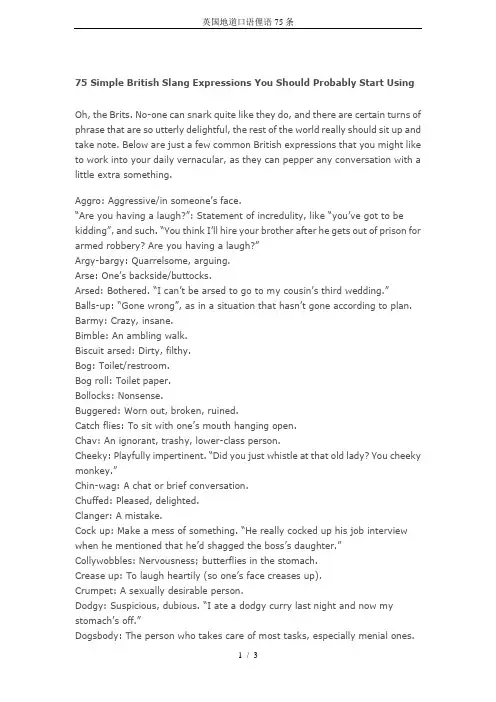
75 Simple British Slang Expressions You Should Probably Start UsingOh, the Brits. No-one can snark quite like they do, and there are certain turns of phrase that are so utterly delightful, the rest of the world really should sit up and take note. Below are just a few common British expressions that you might like to work into your daily vernacular, as they can pepper any conversation with a little extra something.Aggro: Aggressive/in someone’s face.“Are you having a laugh?”: Statement of incredulity, like “you’ve got to be kidding”, and such. “You think I’ll hire your brother after he gets out of prison for armed robbery? Are you having a laugh?”Argy-bargy: Quarrelsome, arguing.Arse: One’s backside/buttocks.Arsed: Bothered. “I can’t be arsed to go to my cousin’s third wedding.”Balls-up: “Gone wrong”, as in a situation that hasn’t gone according to plan. Barmy: Crazy, insane.Bimble: An ambling walk.Biscuit arsed: Dirty, filthy.Bog: Toilet/restroom.Bog roll: Toilet paper.Bollocks: Nonsense.Buggered: Worn out, broken, ruined.Catch flies: To sit with one’s mouth hanging open.Chav: An ignorant, trashy, lower-class person.Cheeky: Playfully impertinent. “Did you just whistle at that old lady? You cheeky monkey.”Chin-wag: A chat or brief conversation.Chuffed: Pleased, delighted.Clanger: A mistake.Cock up: Make a mess of something. “He really cocked up his job interview when he mentioned that he’d shagged the boss’s daughter.”Collywobbles: Nervousness; butterflies in the stomach.Crease up: To laugh heartily (so one’s face creases up).Crumpet: A sexually desirable person.Dodgy: Suspicious, dubious. “I ate a dodgy curry last night and now my stomach’s off.”Dogsbody: The person who takes care of most tasks, especially menial ones.Drop a clanger: To make an obvious mistake or terrible faux-pas.Dull as dishwater: Exceedingly, horribly boring or plain.Ear-bashing: A severe reprimand. “He got a right ear-bashing after crashing his dad’s car into that buffalo.”Fall arse over tit: Take a tumble/head over heels.Gammy: Injured, lame, or painful. “My gran’s had a gammy leg ever since she fell off a horse.”“Get stuffed!”: An angry rebuke, similar to “Go f*ck yourself!”Giddy kipper: An overly excitable person.Ginger: A red-haired person.Gobby: Offensively outspoken.Gobsmacked: Stunned/utterly blown away.Grotty: Unpleasant/disgusting.Gutted: Devastated. “She was gutted after her boyfriend left her for her nephew.”Knackered: Exhausted.Legless: So drunk, one has difficulty standing.Liquid lunch: A meal that consists mostly of alcohol, rather than food.Lost the plot: Lost one’s mind/gone senile. “My great-uncle thinks he’s an admiral with the United Federation of Planets, but of course, he lost the plot years ago.”Lurgy: The flu, or other illness that makes you feel horrible.“Mad as a bag of ferrets”: Utterly and completely insane.Manky: Disgusting. “The chicken you left on the counter for a week has gone manky.”Miffed: Irked.Moggy: Cat.Muck up: Ruin something.Murder: Devour. “I could murder a sandwich right now.”Naff: Unfashionable.Nethers: Euphemism for genitals.Pants: Rubbish. “She said the film was pants, but I rather liked it.”Peckish: Slightly hungry.Peevish: Petulant and sullen.Plonk: Horrible, cheap wine.Prat: An idiot.Rubbish: Ter rible, crap. “I’m totally rubbish at math—can’t even add.”Sad arse: Pathetic person.Sausage fest: An event that has a disproportionate amount of males to females… like a comic convention.Shag: Have sex.Shattered: Worn out, exhausted.Shufflebutt: A restless, fidgety person.Slag: A contemptible person; possibly a promiscuous one.Smarmy: Creepy, sleazy.Smashing: Brilliant, wonderful.Snog: To make out/fool around.Snookered: Defeated/thwarted.“Sod it.”: “I give up.” Used in a sentence: “I’ll never und erstand this math problem. Sod it, let’s go down to the pub.”Sprog: A child/offspring.Starkers: Naked.Taking the piss: Making fun of something.Tosh: Rubbish/nonsense.Tosser: A contemptible idiot.Twee: Overly dainty, delicate, cute, or quaint. “Her bu nny-themed tea set is so utterly twee.”Wazzock: Imbecile.Wonky: Unstable. “The table leg’s a bit wonky; you might want to slide a book under it.”。
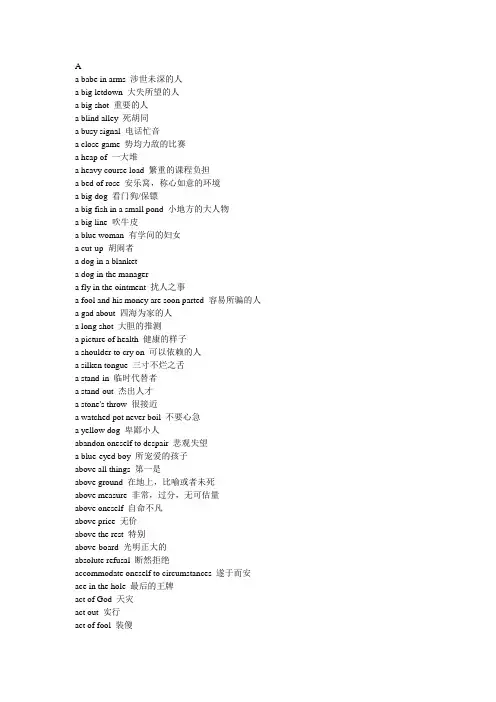
Aa babe in arms 涉世未深的人a big letdown 大失所望的人a big shot 重要的人a blind alley 死胡同a busy signal 电话忙音a close game 势均力敌的比赛a heap of 一大堆a heavy course load 繁重的课程负担a bed of rose 安乐窝,称心如意的环境a big dog 看门狗/保镖a big fish in a small pond 小地方的大人物a big line 吹牛皮a blue woman 有学问的妇女a cut-up 胡闹者a dog in a blanketa dog in the managera fly in the ointment 扰人之事a fool and his money are soon parted 容易所骗的人a gad about 四海为家的人a long shot 大胆的推测a picture of health 健康的样子a shoulder to cry on 可以依赖的人a silken tongue 三寸不烂之舌a stand-in 临时代替者a stand-out 杰出人才a stone's throw 很接近a watched pot never boil 不要心急a yellow dog 卑鄙小人abandon oneself to despair 悲观失望a blue-eyed boy 所宠爱的孩子above all things 第一是above ground 在地上,比喻或者未死above measure 非常,过分,无可估量above oneself 自命不凡above price 无价above the rest 特别above-board 光明正大的absolute refusal 断然拒绝accommodate oneself to circumstances 遂于而安ace in the hole 最后的王牌act of God 天灾act out 实行act of fool 装傻after a storm comes a calm 暴风雨过后的平静after is said and done 终归after hour 规定时间后(办公时间等)aim high 志向远大air oneself 到户外呼吸新鲜空气alibi 借口ask alibi 找借口alive with 洋溢,拥抱all aboard 各位请上车/船all bark and no bite 光说不做all burn up 怒火如焚all gone 希望等的消逝,物品等的丢失all in the day's work 平凡的事情,不稀奇all is still 万籁俱静all lined up, all wind up, all set 一切准备好了all manner of 各色各样all skin and bones 皮包骨all steam go 一切就绪,万事俱备all the better 更好了all the father 尽...所有/所能all the go 非常流行all the worse 反而更坏all there 头脑清醒的all things to all men 八面玲珑all tire out 太疲惫all to the good 幸好all too often 太平常all too 太all turned out 如愿以偿all washed up 全完蛋了all wet 完全搞错了all you have to do 你最好allow for考虑,体谅allow oneself in 沉溺alongside of 与...并排an uphill battle 艰难的战斗and all that 诸如此类and so forth 等等and then 然后any yet 但是angel's visit 难得的客人,难得遇见的事物animated talk 畅谈another matter 另一回事another thing coming (to have ) 注定要到倒霉another time 下次answer back 回嘴answer for 负责,保证any man alive 无论谁any old thing 什么都anything under the sun 任何事情appeal to arms 诉诸武力anywhere near 根本are you telling me 用你来告诉我吗/要你来发好施令吗arrest one's eye 引人注目art and part 策划和参与as a general rule 一般说来as best one can 尽最大能力as best one may 尽力想方设法as broad as it is long 半斤八两as clay in the hand of the potter 得心应手as clear as crystal 十分清楚as clear as day 明若观火as clear as mud 不清晰,混乱as close as a clam 一毛不拔as cross as two sticks 非常生气as dry as bone 口渴as easy as ABC 很简单as faithful as dog 十分忠实as far as that goes 实际上as firm as rock 坚如磐石as gentle as a lamb 性情温顺的as good as a play 非常有趣as good as one's promise 受约as good as one's word 受约as graceful as a swan 姿势优美的as is 照现在的样子,原样as like as chalk and cheese 似是而非as many again as =as much again as两倍于as matters stand 在现状下,按照目前状况as of 在...的时候,直到...之前as per 按照as plain as the nose on one's face (to be) 显而易见as poor as a church mouse 一贫如洗as soft as down 柔软如绒毛as soon 宁愿as sure as I’m alive 十分确实地as the case stands 事实上as the crows flies 笔直地as the saying goes 正如俗语所说的as the world goes 照习惯说as things are 按照目前状况as thought 好像as who should say 可谓,可以这样说as yet 至今还/尚/还as you please 随你意思as you were 复原ask no odds 不求照顾ask the way 问路assume a new aspect 面貌一新at a blow 立即at a dash 一气呵成at a full jump 全速的at a /one stroke 立即/一举at all event 总之at anchor 停泊/抛锚at bay 陷入绝境at best 最好不过/充其量at call 随叫/随要at close hand 在近处/不远将来at cross purpose 目的相反at ease 自由自在at fault 出毛病/出故障at fewest 至少at first blush 乍看/一看at full blast 全速地/大规模地at heart 从内心上,本质上at home in/with擅长at issue 争论at one heels 紧跟着at one word 马上at one's fingertips 了如指掌at one's own charge 自费at one's service 听候某人吩咐at random 随机at sight 一见就at table 在吃饭at the back of one's mind 在心里at the bottom of fortune’s wheel 倒霉透顶at the end of one's rope 忍无可忍at the first face 乍一看at the longest 之多at the peak 最高价at the point of the sword 敌意/剑拔弩张at the point of 临近...的时刻at the tip of one's tongue 话说到嘴边了at the top of one's lung 大声说话at will 随意at worst 在最坏的情况下at your disposal 由你支配at your earliest convenienceaway with it 停止/挪开BB.T.O. big time operator 浪费时间back in the saddle 重整旗鼓bash 大型派对beat him on the spot 当场把他打败beat one's head against the wall 白费力气beat one's brain (out) 做事困难,伤透脑筋beat sb to the draw 抢先某人一步beat someone by miles 远远强于某人beautiful but dumb 木美人before you know it 很快behind the scenes 幕后人物bend over backwards 竭尽全力bet on it 有把握bet your life 你绝对错了between a rack and a hard place 进退维谷between ourselves 秘密地说big headed 傲慢/自大big style 大派头biggie 大人物/很重要的事物bite one's tongue 保持沉默blast 欢乐时光blow it big time 严重的错误blow one's lines 忘记台词bologna 乱讲boot-legging 卖私酒者bootlick 拍马屁bossy 专制的bound to 必定break out in a cold sweat to 突然全身冒冷汗bric-a -brac 小摆设bring them back alive 将他们活捉回来broomstick 瘦如竹扫把bud/buffed朋友buffed 肌肉发达的build castle in the air 空中楼阁bull session 长谈bummed 失望的burn bridge 过河拆桥burn one's finger 遇到挫折burn one's boats/bridges 破釜沉舟,自断后路bury one's head in the sand 逃避butter and egg man 有势力的人buy into something 接受某事物buy your story 相信你的鬼话by and large 大体上Ccall in sick 打电话请病假can manage 有办法can't be better 最好不过cant't get away with it 法网难逃got canned 被炒了card up in one's sleeve 锦囊妙计carefree 无忧无虑cast sheep's eye 暗送秋波castle in Spain 白日做梦sleepy head 爱睡觉的人catch one's eye 引起注意chicken hearted 胆小的人cleaned out (储备品,钱)用完,(商品)售完clunker 老爷车/破旧的汽车cocky/sassy 神气活现cold day in hell 绝对不可能come and get it 试一下来拿吧come off it 少废话,别瞎扯come to a head 到了紧要关头come to think of it 想起来了come up and see me sometime 常来看我comfy舒服的common as an old shoe 不摆架子,平易近人cook up a story 捏造cool your lips 冷静下来country pumpkin 土头头脑cover someone 掩护某人,用枪瞄准某人crane one's neck to see 伸长脖子看什么东西crook 骗子cry wolf 发假警报cuff someone 给某人上手铐curtain lecture 枕边劝戒,妻子私下对丈夫的训话cut class 旷课cut it 能够做某事,成功作做某事Ddapper 花花公子days are numbered 来日无多dead serious 非常认真的Dear John letter 绝交信devil's luck 特别好运气die in shoes 暴死街头dirty work 讨厌的工作,卑鄙的工作do all the talking 言之滔滔的人do it all right 做的不错do it in your stuff 拿出本领来do one's endeavor 尽力为之dog sleep 不时惊醒的睡眠dog watch 夜班dog 丑八怪break one's neck 致命伤don't go off the deep end 不要心灰意冷don't hold your breathe 不要指望don't stick your nose in 不要牵涉在内down something 喝某东西drop the ball 失职drown one's sorrows 借酒消愁Eeasy as pie/cake 容易easy money 易赚的钱either make or break 破釜沉舟enough is as good as a feast 知足常乐enough to get by 够应付的everything is coming up roses 自己经历的每一件事情都eyes bigger than one's stomach 眼馋肚饱eye to eye 看法一致Ffair, fat and forty 中年妇女far and away 毋庸置疑fast worker 闪电恋爱feel oneself 觉得身心舒畅的feeling low 悲观field day 快乐时光,自我放纵fight it out 奋斗fight tooth and nail 爪牙并用,拼命抵抗figure head 无权力的人fine feathers make fine bird 人要金装fish for a compliment for someone 讨某人的恭维fake 不可信任的人flapper 爱打扮的女人flat taste 味道平平flat tire 无精打采;爆胎flats 平底鞋footfall 客流量for a song 很便宜for better or for worse 不计成败for good 永远/一劳永逸for on thing 但是for real 表里如一/可靠的forget that noise 不可能framed 被陷害/遭栽赃freeloader 利用别人的善良或者好客而占人家便宜的人fresh out of sth 耗尽某物,用完某物/新近离开frisk 搜身from the word go 立刻,马上Ggal/dame 女人get a black eye 被打青了眼睛get a clue to 当心,警惕get a hold of oneself 控制情绪get a load of 试试get a move on 赶快get down to 使得自己不受拘束,放纵自己get even 报复get it all together 不慌不忙,沉着冷静get off it 别胡扯/换话题get up enough nerve to do something 鼓足勇气去做某事get someone down 令某人不愉快get rusty 生手gigolo 护花使者give an ear to 听一听give someone a black eye 打得某人鼻青脸肿give him a buzz 打电话给他give him a dirty look 给他憎恨的眼色give him a dirty work 给他难为的工作give him a free hand 由他去干吧give him a lift 送他一程give him some dope 给他一些内幕消息give him the wood 打他几下give him the work 给他点本领看看give it to him 给他一试give someone an inch, he/she will take a mile 得寸进尺go about 怎么办go easy 俭省些go off on someone 对某人大喊大叫go off the deep end 勃然大怒go to one's head 冲昏头脑go to town 竭尽全力去做某事go together 谈恋爱go under th knife 接受外科手术go west 死good God 上帝啊good gracious 天啊good taste 合胃口got the punch 有力的great promiser 食言者green horn 新手Hhail fellow 久仰hang in the balance 平分秋色hang in there 耐心等候/忍耐一下hang on by the eyelids 事情位在旦夕hanky panky 鬼马hard boiled egg 难相处的人hard nut to crack 难于驾驭的女人hard up 经济拮据hard-headed businessman 斤斤计较的商人haul 赶快have a good head on one's shoulder 有见识,明白事理have a weakness for something 酷爱某事物have it bad for 狂恋某物have one's name on sth 某物完全适合某人/为某人度身定做have roses on one's face 脸色红润have the face 厚颜无耻he girl 男性化的女孩to be soft 容易相处he man/big boy 壮硕的男人bark and no bite 动口不动手heart of stone 铁石心肠hell of the time 时光难熬hen-pecked 惧内者hey you 你country jack 乡下佬high and brow 上等的,名贵的his right man 他的得力助手hit it hard 努力做事hit the nail right on the head 完全正确,正中要害hit upon 偶然想出hold it down 保持安静hold on'e own 独当一面hold someone up 抢劫某人hold your horse 慢一点hold up in broad daylight 光天化日之下抢劫hop in 上车horn 电话how you come out 怎么发生的I get yoy my word 我认真答应你I hear ya 我同意I’ll say 我同意,当然I’ll see to it 我来处理它if worse comes to worst 到了万不得已的的时候if you snooze, you lose 如果你不注意,就错过良机了in a sweet 心烦in black and white 立下字据in heat 愤怒地in high (low) spirit 精神愉快,消沉in smooth water 进入顺境in the dog house 陷入困境in the good old day 幸福的日子in the throes of death 受痛苦而死innocent kid 无辜的人it's a steal 真是便宜it's in God's hands 听天由命Jjack of all trade 什么都懂joint 大麻,地方jolly guy 快活的人jump on me 向我发脾气junky 衣不称身just what the doctor ordered 对症下药Kkeep a good house 收拾房子keep body and soul together 温饱keep some posted 使得某人不断得到最新消息keep track 留意kick in the pants 踢屁股kid gloves 小心谨慎kiddies 小孩know sth like the palm of one’s hands 了如指掌Lladies man 女人喜欢的男人lardo 胖子lashes 睫毛lay down the law 立下规矩lay stress on 重视lead a cat and dog life 过着不和谐的生活lead a dog's life 非人生活lean meat 瘦肉leave it to me 让我干吧let down 放弃let someone have it 严厉训斥某人life in not all roses 人生不是十全十美life a finger 不出一点力like a lamb 逆来顺受like a parrot 毫无知识like a rolling stone 行踪不定live up to your words 言必信living encyclopedia 活的百科全书living like a lord 过着贵族的生活living soul 人lose one's cool 发脾气lose track of 失去联系lots of dough 很多钱love handles 游泳圈/胖的腰围Mmake it snappy 提起精神make the gorge rise 令人讨厌make whoopee 欢呼作乐mind your eye 当心miser 守财奴mish-mash 混杂物、大杂烩miss the bus 错过机会miss the boat 错过机会/好东西等money talky 财可以通神monkey 五百美金moonlight 兼职my ass 才怪(强烈质疑)my shoes bite 鞋子小,穿着疼脚Nnail sth down 敲定某事使得万无一失nail the brakes 急刹车nip sth in the bud 防患于未然no fun 没有意思no laughing matter 非同小可not to wear your heart on your sleeve 不要太情绪化nothing but skin and bones 很瘦now you're talking 你说得有道理Oold dog 上年纪的人old hand 老手old man 老爸,男朋友,老公old timer 老手,老资格on a good note 欢尽而散on a horse 快马加鞭on pins and needles 坐立不安on the edge of my seat 专心地听和看on the rock 处境困难one way or the other 千方百计out and out 完全地out of one's hold 脱手out of form 不合时,不合身out of it 精神恍惚get canned 失业out of sort 发脾气out of spirit 心神不安over and over 多次地,重复地over grown 孩子气own boss 自己当老板Ppass the back 让人做吧past all hope 无可救药pat him on the back 联络感情prayer(没有)成功的可能性pull devil, pull baker 加油pull sth 干坏事pull the dirty trick 有意愚弄pull the purse string 吝啬punch your light out 打得你两眼发黑put a finishing touch 最后修饰put a good show 好好干吧put on air 宣传put one's shoulder to the wheel 全力以赴put some heart on 施加压力put sb up 为某人提供膳食put sth on the back corner 推迟做某事put one's feet on the ground 脚踏实地put your heart at rest 放下心来Rraid the fridge 吃光冰箱里的食物raise hell 大发牢骚read sb the riot act 训诫某人ritzy 豪华的rosy prospect 美好前景rosy view 乐观看法rosy 美满round way 圆滑一点round-table conference 圆桌会议rubber check 空头支票rubbish 胡说Ssad news (令人悲伤的消息)账单same old stuff 一样的东西sandals 凉鞋save one's neck 免受苦难sawing wood 鼾声如锯木scallker 黄牛党scare the devil out of sb 吓死人secret sorrow 难言之隐set the world on fire 一些震撼世界的杰出成就shadow/tail 跟踪shake and make up 握手言和bloody shame 可耻shop till one drops 购物直到累死show down 决胜者show sb the back door 下逐客令make a hit 出风头show up 到达side money 横财sissy 娘娘腔的,基佬sit on the top of the world 自大japs/Skeepie 日本人sleep a wink (没有)合眼slightest idea 一点意思也没有slop 劣质食品smart guy 手段漂亮的人snobbish 有绅士架子的人soak 要价太高soft soap 滑头sonny boy 可爱的孩子sore spot 致命伤speak the same language 志同道合spell out of town 驱逐处境spic and span 非常整洁spineless 没有骨气spitting image of someone 于某人一模一样spoil the show 煞风景spring for 请客square one's words with one's conduct 言行一致squeeze 扒钱stand no more nonsense 不准儿戏stand one's ground 坚持己见,原地踏步start from square one 重头开始stay up till all the hours of the night 彻夜未眠step it up 采取行动step on one's big toe 激怒某人stick-up 抢劫sticky business 让人左右为难的事情stool pigeon 内鬼stop on a dime 突然停止stowaway 偷渡的人strong meat 难以理解的问题suck one's brain 投机取巧sugar coated 口蜜腹剑sweat like a pig 汗流浃背sweet water 饮用水swell/regular guy 好人swell head 自大swing for the fence 全垒打Ttake a dump 大便take a spin 兜风take him for a ride/ bump him 杀掉他take order from 听命于人take sb in 将某人交给警方处理take sth in stride 从容处理take sth lying down 甘心忍受某事teach your grandmother to suck eggs 班门弄斧头teacher's pet 老师最爱的学生that does it 我受够了the finishing touch 最后修饰the general effect 总结果the green years 青春年华the way-side rose 路边的玫瑰through a/the wringer 受尽苦难through and through 完全地throw in the towel 认输ticked off 生气tick-tock 滴答声tight wad 守财奴tip-top 最佳的to be a jelly-fish 做事无头脑to be all eyes 注视,惊奇的看to be down at heels 不修边幅to be eyesore 眼中钉to be hot-headed 容易发怒to be as like as two peas 十分近似to be shabby 脏脏的to be smart 整洁的to be well groomed 容光焕发to bring down the house 博得满堂喝彩to do/play one's part 尽自己职责to go smash 破产to have eyes bigger than the belly 贪婪to have face as long as a fiddle 拉长脸to hold one's course 坚定不移to hold one's tongue 谈话含蓄to live a fool's paradise 愚人自欺to make things ship shape 使得一切井井有条to one's liking 合胃口的to pitch into anyone 大人或者重罚某人to see through the rose-colored glasses 太乐观了to speak for itself 事实之言to speak in parables 说话装腔作势to speak one fair 使人信服to speak volume 中肯之言toe the line 循规蹈矩toe-to-toe 竞争top banana 主管人员topsy-turvy 颠倒是非trash sb 严厉批评某人,破坏某物turn in 睡觉turn over a new leaf 改过自新turn the cold shoulder on 冷淡对待turtle on one's back 自身难保two-faced 两面派Uuncrown mayor 无冕之王under the rose 秘密进行up to this minute 摩登的ups and downs 盛衰upstart 爆富Vvanish to thin air 消失的无影无踪walk on air 高兴地飘飘然wash it down 吞下,正餐后喝点东西wash out 洗手不干what gives 出了什么事what is cooking 酝酿着what is in your mind 你心意如何what the hell 有什么稀奇what's with you 什么事情让你烦恼what's her face 她叫什么来着,我忘记了她的名字when it rains, it pours 事情一发生便接踵而至whiz/pick-pocket 小偷whoa 哇whoopee 哇win your heart 赢得你的心within limits 适可而止Yyanks 美国人yesman 应声虫you're all wet 你完全错了you don't know half of it 你什么都不懂you rat 鼠辈。
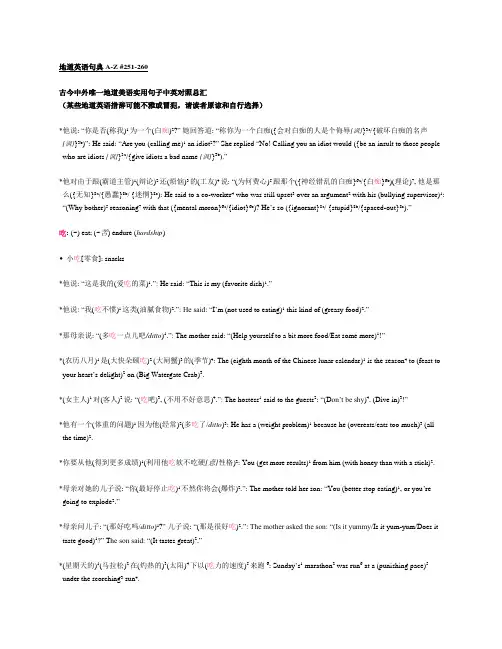
地道英语句典A-Z #251-260古今中外唯一地道美语实用句子中英对照总汇(某些地道英语措辞可能不雅或冒犯,请读者原谅和自行选择)*他说: “你是否(称我)1为一个(白痴)2?”她回答道: “称你为一个白痴({会对白痴的人是个侮辱[讽]}3a/{破坏白痴的名声[讽]}3b)”: He said: “Are you (calling me)1 an idiot2?” She replied “No! Calling you an idiot would ({be an insult to those people who are idiots [讽]}3a/{give idiots a bad name [讽]}3b).”*他对由于跟(霸道主管)1(辩论)2还(烦恼)3的(工友)4说: “(为何费心)5跟那个({神经错乱的白痴}6a/{白痴}6b)(理论)7, 他是那么({无知}8a/{愚蠢}8b/ {迷惘}8c): He said to a co-worker4 who was still upset3 over an argument2 with his (bullying supervisor)1: “(Why bother)5 reasoning7 with that ({mental moron}6a/{idiot}6b)? He’s so ({ignorant}8a/ {stupid}8b/{spaced-out}8c).”吃: (~) eat; (~苦) endure (hardship)小吃[零食]: snacks*他说: “这是我的(爱吃的菜)1.”: He said: “This is my (favorite dish)1.”*他说: “我(吃不惯)1这类(油腻食物)2.”: He said: “I’m (not used to eating)1 this kind of (greasy food)2.”*那母亲说: “(多吃一点儿吧/ditto)1.”: The mother said: “(Help yourself to a bit more food/Eat some more)1!”*(农历八月)1是(大快朵颐吃)2 (大闸蟹)3的(季节)4: The (eighth month of the Chinese lunar calendar)1 is the season4 to (feast to your heart’s delight)2 on (Big Watergate Crab)3.*(女主人)1对(客人)2说: “(吃吧)3, (不用不好意思)4.”: The hostess1 said to the guests2: “(D on’t be shy)4. (Dive in)3!”*他有一个(体重的问题)1因为他(经常)2(多吃了/ditto)3: He has a (weight problem)1 because he (overeats/eats too much)3 (all the time)2.*你要从他(得到更多成绩)1(利用他吃软不吃硬[意]性格)2: You (get more results)1 from him (with honey than with a stick)2.*母亲对她的儿子说: “你(最好停止吃)1不然你将会(爆炸)2.”: The mother told her son: “You (better stop eating)1, or you’re going to explode2.”*母亲问儿子: “(那好吃吗/ditto)1?”儿子说: “(那是很好吃)2.”: The mother asked the son: “(Is it yummy/Is it yum-yum/Does it taste good)1?” T he son said: “(It tastes great)2.”*(星期天的)1(马拉松)2在(灼热的)3(太阳)4下以(吃力的速度)5来跑6: Sunday’s1 marathon2 was run6 at a (punishing pace)5 under the scorching3 sun4.*他说: “我将会(毫不约束地)1在今天晚上的(任吃自助餐)2 (大吃大喝/ditto)3.”: He said: “I’m going to (let go)1 and (pigout/feast)3 at the (all-your-can eat buffet)2 tonight.”*他说: “在我(稍为年轻的日子)1我能够(每一餐)2在(少于十分钟)3 (吃完/ditto)4(四碗饭)5.”: He said: “In my (younger days)1, I could (finish eating/polish off/gobble down/wolf down/finish off)4 (four bowls of rice)5 (each meal)2 in (less than ten minutes)3.”*母亲对孩子说: “(快点儿吃)1, 我们(很快地)2要({走了/ditto}3a/{上路}3b).”: The mother said to the children: “(Eat up)1. We have to ({go/get going}3a/{hit the road}3b) soon2.”*她问道: “那苹果(好吃)1吗?”他说: “(当然)2({那是好吃/ditto}3a/{那是甜啦}3b).”: She asked: “Does the apple (taste good)1?”He said: “(Of course)2 ({it’s tasty/it tastes great}3a/ {it’s sweet}3b).*在(做生意)1, 如果你不(适应)2 (变动市场动态)3, (竞争对手)4将会(把你活生生吃掉)5: In (doing business)1, if you don’t adapt2 to (changing market dynamics)3, competition4 is going to (eat you alive)5.*妻子说: “我可以(做饭)1我们(在家里吃/ditto)2, 或是我们可以({叫外卖}3a/{在外面吃}3b): The wife said: “I can cook1 and we can (eat in/eat in at home)2, or we can ({order some takeout}3a/{eat out}3b).”*很多(年轻人)1(生命中要挑战)2, 但她的(二十岁儿子)3每天只要(吃得满足)4然后(去睡觉)5: Many (young people)1 (want challenges in life)2, but her (twenty-year-old son)3 just wants to (eat his fill)4 and then (goes to sleep)5 every day.*他问(侍应生)1道: “在这(饭店)2({有没有好吃的/ditto}3a/{有没有好菜}3b)你可以(介绍)4吗?”: He asked the waiter1: “({Any good eats/Anything good to eat}3a/{Any tasty dishes}3b) you can recommend4 in this restaurant2?”*他问道: “你(午饭)1会喜欢要什么?”“只是({买}2a/{弄}2b)点儿(任何简单吃的)3(就行/ditto)4.”: He asked: “What would you like to have for lunch1?” She said: “Just ({buy}2a/{get}2b) (any simple eats)3 (would be fine/would do)4.”*他说: “是(吃午饭时间)1了, (你来吗)2?”他的朋友说: “(我没钱)3, 但如果(你请客)4我是(乐意)5的.”: He said: “It’s (lunch time)1. (Are you coming)2?” His friend said: “(I’m broke)3, but if (you treat)4, I’m game5.”*他问道: “你要(任何东西跟啤酒一起)1吗?”他的朋友说: “让我们(点些手指拈着吃的食物)2做(小吃)3.”: He asked: “Do you want (anything to go with the beer)1?” His friend said: “Let’s (order some finger food)2 for snack3.”*他说: “很多人说(公立学校)1的(初中)2(家庭作业)3没有(私立学校)4那些的(吃力)5.”: He said: “Many say (junior high)2 homework3 at (public schools)1 is not as demanding5 as that in (private schools)4.”*(驾驶三小时后)1, 他对他的女朋友说: “(我肚子饿)2, 让我们(随便快速吃些东西/ditto)3(走回上路)4.”: After (driving for three hours)1, he said to his girlfriend: “(I’m hungry)2. Let’s (grab a bite to eat/grab something to eat/eat something quick)3 and (get back on the road)4.”*他(进餐之间)1(不停一点一点地吃)2(零食)3的(坏习惯)4是他(控制体重有困难)5的(主要负责原因)6: His (bad habit)4 of (picking at)2 snacks3 (between meals)1 (largely accounts for)6 his (weight-control problem)5.*母亲说: “晚饭(准备好了)1, 是你(喜爱的)2(意大利面条)3和(肉丸子)4.”小约翰说: “(好吃好吃/ditto)5.”: Mother said: “Dinner is ready1! It’s your favorite2 spaghetti3 and meatball4.” Little John said: “(Yum yum yum/Yummy yummy)5!”*他的女朋友对他说: “我不用(你大费气力在厨房协助)1, 只是(不用做事等着)2(当晚饭造好)3(大吃/ditto)4吧.”: His girlfriend said to him: “I don’t need (your big help in the kitchen)1. Just (sit back and wait)2 to (feast/stuff your face/fill your face)4 (when dinner is ready)3.”*他的妻子问道: “你不吃东西, 为什么?”他说: “(有那么多麻烦事)1({围绕着}2a/{威胁着我}2b)我(失掉了胃口)3.”: His wife asked: “You’re not eating. Why?” He said: “I’ve (lost my appetite)3 (with so many problems)1 ({around}2a/ { hanging over my head }2b).”*这一间(小饭馆)1(在午饭)2你可以花少于二十块钱 ({吃得你称心满意}3a/{吃得你饱饱的}3b/ {你尽情地吃}3c): At this diner1, you can ({eat to your heart’s delight}3a/{eat your fill}3b/{eat your heart out}3c) (at lunch)2 for less than $20.*在过去六个月他({不吃}1a/{戒除/ditto}1b)(炭水化合物)2 (在过程中)3({把四寸从腰围除去}4a/{失掉十五磅}4b): He has ({kept off}1a/{abstained from/cut out/laid off}1b) carbohydrates2 for the last six months, and (in the process)3 has ({taken off four inches from the waistline}4a/{lost 15 pounds}4b).*他说: “只是因为我胖, 人们(不用思索)1(认为)2我是(贪吃/馋嘴)3和(懒惰/ditto)4.”我说: “(那不是正确的)5, 你只是(幻想)6它.”: He said: “Just because I’m fat, people automatically1 think2 I am (gluttonous/voracious)3 and (lazy/indolent)4.” I said: “(That’s not true)5. You’re only imagining6 it.”*他母亲对他说: “你应该(小心/ditto)1(你所吃的东西/ditto)2并({减少/ditto}3a/{停止/ditto}3b/{停止吃}3c)(油腻/ditto)4的({东西}5a/{食物}5b).”: His mother said to him: “You should (watch/be careful on)1 (your diet/what you eat)2 and ({cut back/ reduce}3a/{lay off/cut out}3b/{stop eating}3c) (oily/fatty/greasy)4 ({stuff}5a/{food}5b).”蚩: (~) (p. noun)嗤: (~笑) tease*他说: “一份五万块钱一年(在行政初入行级别)1的工作不是应该({嗤之以鼻}2a/{蔑视}2b)的.”: He said: “A $50,000 a year job at the (executive entry level)1 is nothing to ({sneeze at}2a/{sneer at}2b).”chí:迟[遲]: (~到) arriving late; (~缓) sluggish*她(今早多睡了)1(迟了半小时上班)2: She (slept in/overslept)1 this morning and (got to work half-an-hour late)2.*那(银行保安员)1对他说: “你是(太迟)2了. (银行已经关门了)3.”: The (bank security guard)1 said to him: “You’re (too late)2. The (bank is closed)3.”*他的朋友对他说: “不要(迟延/ditto)1(呈递)2你的(大学入学)3(申请)4.”: His friend said to him: “D on’t (delay/drag yourfeet/put off/procrastinate)1 (sending in)2 your (college admission)3 application4.”*({地铁伸长的提议}1a/{引进增值税}1b)已经被(无限期地)2(延迟/ditto)3: ({The subway extension proposal}1a/ {The introduction of value-added tax}1b) has been (mothballed/postponed/deferred/put on ice/put off)3 indefinitely2.*他(打电话)1给他的姐姐说: “我(还在办公室)2, 但我将(最迟)3在八点(赶到饭馆)4.”: He called1 his sister and said: “I’m (still at the office)2, but I’ll (get to the restaurant)4 at eight (the latest)3.”*(国家安全机关)1(经理)2说: “(事不容迟)3我们一定(马上)4(处理)5(保安泄漏)6.”: The (National Security Agency)1 manager2 said: “(There is no time to lose)3 and we must (attend to)5 the (security leak)6 (right away)4.”*他(快慰态度)1地说: “我四十五岁才(开始中学)2(有点儿不寻常)3, 但(迟一点好过永远不做)4.”: He said in a (jovial manner)1: “It’s (a bit unusual)3 for me to (start high school)2 at the age of forty-five but it’s (better late than never)4.”*他({推开}1a/{冲过}1b)大门说: “对不起我(迟到)2了, 我 ({被堵车困住}3a/{被交通耽误了}3b).”: He ({pushed open}1a/ {rushed through}1b) the door and said: “Sorry I’m late2. I ({was stuck in traffic}3a/{was held up by traffic}3b).”*他说: “(来吧)1, (家伙们)2, (加快一点儿/ditto)3, 我们({已迟了}4a/{处于迟到的状况}4b).”: He said: “(Come on)1, fellas2, (speed it up/hurry up/shake a leg [古]/get it moving/hustle up)3! We’re ({late}4a/{running late}4b)!”*他说: “我生日两个月后收到我女朋友(迟来的生日礼物)1(哑口无言/ditto)2, 我(猜想)3(迟来胜于永远不来)4.”: He said: “I (didn’t know what to say/was lost for words/was at a loss for words)2 when I received a (belated birthday present)1 from my girlfriend two months after my birthday, and I suppose3 (it is better late than never)4.”*那(杰出的公司)1最近(遭遇一些小挫折/ditto)2, (一再)3(恢复)4({不错的水准}5a/{优越表现}5b) (是迟早的事)6: This (class company)1 lately (hit a few bumps/had a few rocky patches/experienced some hiccups)2 and (it’s a matter of time)6 before it (returns to)4 ({respectability}5a/{excellence}5b) (once again)3.*我见到他(冲进)1(健身馆)2(比较平常迟了半小时)3, 我说: “你迟了”, 他回答道: “是了, 我今天(进行迟了一点儿)4”: I saw him (rushed into)1 the gym2 (half-an-hour later than usual)3and I said: “You are late.” He replied: “Yeah, I’m (running a bit late)4today!”*那两个好朋友(大吵一顿)1, 其中一个说: “你是那么(脑袋迟钝/ditto)2你(永远不会知道)3谁是你的(真正/ditto)4(朋友)5.”: The two good friends (had a big fight)1, and one of them said: “You’re so (thick/dense)2 you (never know)3 who your(real/true)4 friends5 are.”*随着(强劲的币值)1(导致损失了)2国内(几十万)3份(制造业职位)4后今天(中央银行)5(调低)6(基本利息)7四分之一厘, 但那是有一点儿(太少太迟)8: The (central bank)5 cut6 the (key interest rate)7 by a quarter point today after the (strong currency)1 had cost2 (hundreds of thousands)3 of (manufacturing jobs)4 in the country, but it was a bit (too little too late)8.踟: (~蹰)hesitate*这公司关于任何一个它的(主要原料)1(踟蹰)2(专致于)3(单一个供应商)4, 因为那么做会(使它)5(容易受害于)6(供应中断)7: This company (hesitates to)2 (commit to)3 (a single supplier)4 for any one of its (key raw materials)1, because such would (make it)5 vulnerable6 to (supply disruptions)7.持: (~) grasp; (坚~) steadfast; (主~) in charge; (支~) support*施密夫(法官)1(主持)2那({宗法庭案件}3a/{个会议}3b): Judge1 Smith (presided over)2 ({that court case}3a/ {that meeting}3b).*在(家人)1(坚持)2下这(工作狂)3(不愿意地去休假/ditto)4: This workaholic3 (took a reluctant vacation/took a vacation reluctantly)4 (at the insistence)2 of his family1.*在(市后交易)1({黄金/ditto}2a/ {原油}2b)(保持)3(今天的增加)4: ({The yellow metal/ Gold}2a/{Crude Oil}2b) (held onto)3 (today’s gain)4 in (post market trading)1.*(中立的球迷)1(一般)2(呼叫支持/ ditto)3(公认赢面较低)4的(队伍)5: (Neutral fans)1 generally2 (roots for/cheers for)3 underdog4 teams5.*他说: “有一个(职业会计师)1(支持你)2, (在控制你财务)3上(肯定会做得更好)4.”: He said: “With a (professional accountant)1 (in your corner)2, you’re (bound to fare better)4 in (controlling your finances)3.”*他说: “(经历好坏时光)1我们({支持/ditto}2a/{维持忠心于/ditto}2b)我们的(领导人)3.”: He said: “We ({stand behind/ stand by/support}2a/{remain faithful to/stay loyal to}2b) our leader3 (through thick and thin)1.”*一个(城市官员)1说: “如果(下雨维持现状)2再三天整个城市将会(被水淹没/ditto)3.”: A (city official)1 said: “If the (rain keeps up)2 for another three days the whole city will be (flooded/under water)3.”*(舞台经理)1说: “这(露天)2(舞台)3(看来)4(类似)5(不稳固)6, 我希望它能够(持续不倒)7(至完成)8(表演)9.”: The (stage manager)1said: “This outdoor2 stage3 looks4 (kind of)5 shaky6, and I hope it can (hold up)7 through8 the performance9.”*他的父亲对他说: “(支持你的朋友 )1(当有需要时)2是(值得歌颂的事)3, 但你要({小心/ditto}4a/{留神/ditto}4b)(不被利用)5: His father said to him: “I t’s honorable3 to (stand by your friends)1 (in time of needs)2, but you have to be ({careful/ cautious}4a/{mindful/aware}4b) (not to be taken advantage of)5.”*这个(黑手党)1(头儿)2是(太滑溜)3来(被抓到)4(因为/ditto)5他有(一群)6({朋比为奸支持者}7a/{恶棍/ditto}7b)和(律师)8来做他的(不轨事)9: This Mafia1 boss2 is (too slick)3 to (get caught)4 (because/since)5 he has (a bevy of )6 ({henchmen}7a/ {goons/thugs/ hoodlums/gorillas}7b) and lawyers8 to do his (dirty work)9.*一个(批评家)1(写及)2那(市政议员)3: “我知道他(对世界上什么东西也反对)4因为那是他({不懂世故}5a/{无知}5b) (跟随者)6所(要求听到的)7, 但(坦白)8他是(支持)9什么呢?”: A critic1 (wrote about)2 the (city councilor)3: “I know he is (opposing everything under the sun)4 because that’s what his ({unsophisticated}5a/{ignorant}5b) followers6 (want to hear)7. But frankly8 what is he (rooting for)9?”*(尽管)1(忠心者)2和(跟风者)3 (同样地)4(评击)5, 那(投资)6({传奇人物}7a/{具影响力的专家}7b/{代表性人物}7c/{天才}7d)(坚持原定计划)8当(高科技)9({暴涨}10a/{极度兴奋}10b)(避开)11(科技股)12, (最终)13当那(部分)14({熔化}15a/{崩溃}15b)他(幸存)16下(结果骄人[意])17: Despite1 criticisms5 from diehards2 and bandwagoners3 alike4, the investment6 ({legend}7a/ {guru}7b/{icon}7c/{genius}7d) (stuck to his guns [note: not “gun”])8 by (staying away)11 from (technology stocks)12 during the high-tech9 ({boom}10a/{euphoria}10b). Eventually13 he (came through)16 (smelling like a rose)17 when the sector14 ({melted down}15a/ {collapsed}15b).池: (~) water pool; (舞~) dance floor♦池塘: pond♦游泳池: swimming pool*(荷花)1(茂盛地生长/ditto)2在我们(老乡)3(祖屋)4后面的(池塘)5: (Water lilies)1 (grow in abundance/flourish)2 in the pond5 behind our (family home)4 in the (old village)3.*那些(竞赛者)1从(游泳池)2的(浅端)3游到(深端)4(再返回)5两次: The competitors1 swam from the (shallow end)3 to the (deep end)4 of the pool2 (and then back)5 twice.弛: (松~) relax*我问我的朋友: “这个周末你将会(工作)1还是(松弛一下/ditto)2?”: I asked my friend: “Are you going to work1 or (chill/chill out/relax)2 this weekend?”驰[馳]: (~骋) gallop; (~名) propagate (fame)*这北京饭店的(烤鸭)1是(世界驰名)2的: The (barbecued ducks)1 in this Beijing restaurant are world-renowned2.匙: (~) spoon♦汤匙: soup spoon♦羹匙: ladlechǐ:耻: (羞~) shame*在四十五岁他还(无耻地经济上依靠父母)1: At the age of 45 he is still (living shamelessly off his parent)1.*他对(他本身失败)1(归咎/ditto)2(除了自己以外的所有人)3是(可耻的/ditto)4: He is (contemptible/despicable/pathetic)4 (to blame/to put the blame on)2 (everyone else but himself)3 for (his own downfall)1.*她可能是(富有和吸引)1, 但她的(恶臭态度)2使她成为个(不受欢迎的)3(可耻小人/ditto)4: She may be (rich and attractive)1, but her (stinky attitude)2 makes her an unwelcomed3 (jerk/dipstick)4.*他说: “我不(责怪)1他(拒绝/ditto)2(在为其他人舍他而去后的)3(异离妻子的)4 (厚颜无耻)5(要求)6之(赡养费)7.”: He said: “I don’t blame1 him for (declining/refusing)2 his (estranged wife’s)4 brazen5 request6 for (support payments)7 (after she walked out on him for someone else)3.”*因(猥亵儿童)1(服刑)2(五年坐牢时期)3后他在(耻辱)4和(声名狼藉)5中(生活)6({直至他的死亡}7a/{在余下生命}7b): He lived6 in disgrace4 and infamy5 ({until his death}7a/{for the rest of his life}7b) after serving2 (five years of jail time)3 for (child molestation)1.*那(声称)1为(强奸受害者的)2对警方(供认过错)3(破坏/ditto)4她(同犯的)5 (无耻企图)6去对(足球巨星)7({毁坏其名誉}8a/{勒索}8b): The alleged1 (rape victim’s)2 confession3 to the police (thwarted/frustrated/spoiled/ put a stop to)4 her accomplice’s5 (vile attempt)6 to ({discredit}8a/{blackmail}8b) the (soccer superstar)7.*那({宣称}1a/{所谓}1b)(仲裁能手的)2(无能)3去(中止/ditto)4(公交罢工)5(漫长的僵局)6把(耻辱)7({遗留在}8a/{放上}8b)({委任}9a/{推荐}9b)他的(运输部长)10: The ({proclaimed}1a/{so-called}1b) (arbitration expert’s)2 inability3 to (break/end)4 the (prolonged impasse)6 in (transit strike)5 ({left}8a/{put}8b) (egg [note: not “eggs”] on the face)7 of the (Transportation Minister)10 that ({appointed}9a/{recommended}9b) him.*他说: “我是({出生于}1a/{成长在}1b)一个({唯物主义}2a/{偏重金钱}2b)的(家庭)3({圈子}4a/{环境}4b), 我的(亲戚)5会({对我引以为羞耻}6a/{远离我}6b)如果我({没有钱}7a/{是贫穷}7b).”: He said: “I was ({born into}1a/{raised in}1b) a ({materialistic}2a/{money-oriented}2b) family3 ({circle}4a /{setting}4b), and my relatives5 would ({be ashamed of me}6a/ {keep their distance from me}6b) if I ({don’t have money}7a/{am poor}7b).”侈: (奢~) spendthrift; (~谈) prattle*(一个担忧/ditto)1的(市民)2说: “正当这(艰巨经济时期)3我们的(市长)4(花费)5两万块钱在(一豪华酒店会议室)6用于(市政会议)7(你不是认为)8(那是有一点儿)9太(奢侈浪费/ditto)10吗?”: (A concerned/A worried/An apprehensive)1 citizen2 said: “(Don’t you think)8 (it’s a bit)9 too (extravagant/spendthrift/ wasteful)10 for our mayor4 to spend5 $20,000 on (a luxury hotel conference room)6 for a (council meeting)7 during this (harsh economic time)3?”尺: (~) ruler (measuring); (~) foot (12 inches); (~码) measurement♦直尺: ruler (stationery)♦卷尺: measuring tape♦一把尺子: a ruler*她的朋友问道: “你穿什么(尺码)1的(鞋子)2呢?”: Her friend asked: “What shoe2 size1 do you wear?”豉: (豆~) pickled black bean齿[齒]: (~) teeth or tooth-like parts*那(邮差)1(迎面对着)2一条(咆哮)3和(露齿)4的狗: The postman1 was confronted2 by a growling3 and teeth-showing4 dog.*很多员工可能(认为)1他们是(在组织机器)2({重要}3a/{非常重要/ditto}3b)和({不能缺少}4a/{不能代替}4b)的({轮齿}5a/{部分}5b)但(管理层)6有他们的(意见/ditto)7: Many employees may think1 they are ({important}3a/{key/crucial/ vital}3b) and ({indispensable}4a/ {irreplaceable}4b) ({cogs}5a/{components}5b) (in the machine of the organization)2, but management6 have their own (ideas/opinions)7.chì:叱: (~骂) scold*她说: “我的父母是(不快乐的人)1, (当我年轻时)2他们时常(无缘无故/ditto)3(叱骂/ditto)4我.”: She said: “My parents are (unhappy people)1, and they always (scolded/yelled at)4 me (for nothing/for no reason)3 (when I was young)2.”斥: (~责) reprimand; (排~) exclude*当(全个办公室员工)1(除了他)2被(邀请)3到(女经理的)4(婚礼)5他(感到被排斥)6: He (felt left out)6 when the (entire office)1 was invited3 to the manageress’s4 wedding5 (except him)6.*他的(粗俗/ditto)1(性格/ditto)2使他成为他(上流社会朋友)3 (之中的)4(被排斥者/ditto)5: His (crude/unrefined/ unsophisticated)1 (disposition/ personality/character/ temperament)2 makes him the (outcast/pariah)5 (among/ amongst)4 his (high society friends)3.*(经理)1因为没有(管理层)2({批准}3a/{允许/ditto}3b)跟(媒体)4(对话)5关于公司(事项)6被(斥责/ditto)7: The manager1 was (reprimanded/castigated/ chastised/reproached/chewed out)7 for speaking5 to the media4 on company matters6 without management2 ({approval}3a/{authorization/permission}3b).赤: (~) red; (~诚) righteous; (~贫) devoid of money; (~身露体) stark naked*(减少赤字)1是政府的(首要)2(在议程待办事项)3: (Deficit reduction)1 is (at the top)2 of the government’s agenda3.*新政府(面对)1(瘫痪的)2(赤字)3和(不可能克服的欠债)4: The new government faces1 a crippling2 deficit3 and an (insurmountable debt)4.*他因为在一个(棒球球赛)1(裸跑)2被(控告)3({轻微的罪}4a/{刑事公开赤身露体}4b): He was charged3 with ({misdemeanor}4a/{indecent exposure}4b) for streaking2 at a (baseball game)1.翅: (~) birds’ wings or fish’s fins炽[熾]: (~热) scorching*这(油田)1(争出高价购买战)2(正在进行得炽烈)3: The (bidding war)2 for the (oil patch)1 (is heating up)3.*今年我们(目击)1(新股上市)2(踏着炽热的步伐)3: This year we have witnessed1 the (torrid pace)3 in (new stock issuances)2.*他说: “这些在我们(店子)1(炽热)2的(便宜售卖货品)3一定会(使你震惊)4.”: He said: “These (sizzling hot)2 deals3 in our store1 are going to (knock your socks off)4.”chōng:憧: (~憬) envision; (人影~~) a continuous stream of people’s shadows moving*({有深入了解/ditto}1a/ {有聪明富幻想}1b)(憧憬公司将来)2需要(明澈了解)3(行业前进的方向)4和(公司怎样适应)5: ({A perceptive/An insightful/ A clear-headed}1a/{An ingenious}1b) (vision of the company)2 requires (a clear understanding)3 of (where the industry is heading)4 and (how the company fits in)5.充: (~满) packed with; (~当) act the part of; (假~) pretend; (~足) sufficient*他在(参加)1公司(那一刻)2已(充满意欲)3要(达管理顶层)4的(雄心)5: He was consumed3 with ambition5 to (get to the top)4 (the moment)2 he joined1 the company.*我问道: “你有(一觉好睡)1吗?”他说: “我(补充足了精力)2(准备去行动)3了.”: I asked: “Did you have a (good night sleep)1?” He said: “I’m (all charged up)2 and (ready to go)3.”*跟(活力充沛/ditto)1但(缺乏经验)2的(一组人)3(工作)4可能(困难重重地充满)5(不合意)6的(结果)7: Working4 with (an energetic/a peppy)1 but inexperienced2 team3 may (be fraught with)5 undesirable6 consequences7.*这(戏剧)1(充满/ditto)2(极端可笑/ditto)3的({笑料}4a/{乐趣}4b)和({急才}5a/{精明}5b)的(俏皮话)6: This play1 is (filledwith/packed with/ jammed-packed with/chock-full with/bursting with)2 (gut-splitting/sidesplitting/hilarious/hysterical)3 ({laughter}4a/{fun}4b) and ({witty}5a/ {brilliant}5b) wisecracks6.*这小国家(复苏的旅程)1({危机重重地充满}2a/{充满/ditto}2b)(政治)3, (社会)4, 和(经济)5的(陷阱)6: The (road to recovery)1 of this little country is ({fraught with}2a/{filled with/laden with}2b) political3, social4, and economical5 landmines6.*任何(正派读者)1应该对这(专栏作者)2(充满/ditto)3(不适当性欲暗示)4和(对小数团体)5 (贬低评语)6的(文章)7(感到被冒犯/ditto)8: Any (decent reader)1 should (take exception to/be offended by)8 the articles7 of this columnist2 that is (thick with/fullof/filled with)3 (sexual innuendos)4 and (derogatory comments)6 (against minority groups)5.冲[沖/衝]: (~) flush (with water); (~锋) rush; (~击) ramp; (要~点) strategic (location); (~帐) offset (balances); (~突) contradicting; (~动) rash*他(冲过红灯)1被(罚款)2二百块钱: He was fined2 $200 for (running a red-light)1.*这银行此(季度)1要(冲销)2(一大笔)3(坏账)4: The bank has to (write off)2 (a large sum)3 of (loan loss)4 this quarter1.*(合并)1因两公司(总裁)2的(冲突)3而(撤销)4: The merger1 dissolved4 over clashes3 between the presidents2 of the two companies.*他是个(敢做敢为有冲劲)1和(有自信)2的(年轻人)3: He is an aggressive1 and assertive2 (young man)3.*这(延续了三年)1的(牛市)2似乎(失去)3它的(冲劲/ditto)4: The (three-year old)1 (bull market)2 seems to have lost3 its(legs/push/momentum)4.*他在美国公开网球赛事(有好冲刺)1(结果是)2(总体第二)3: He had a (good run)1 at the U.S. Open Tennis Tournament and (came in)2 (second overall)3.备注请参阅:地道英文俚语A-Z#0。
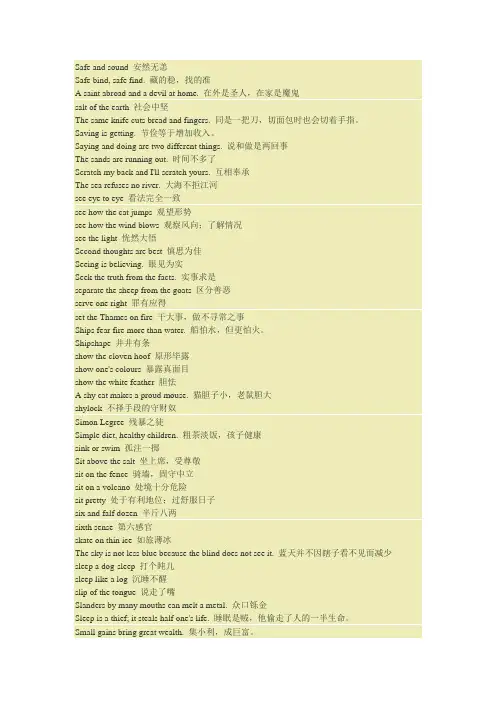
Safe and sound 安然无恙Safe bind, safe find. 藏的稳,找的准A saint abroad and a devil at home. 在外是圣人,在家是魔鬼salt of the earth 社会中坚The same knife cuts bread and fingers. 同是一把刀,切面包时也会切着手指。
Saving is getting. 节俭等于增加收入。
Saying and doing are two different things. 说和做是两回事The sands are running out. 时间不多了Scratch my back and I'll scratch yours. 互相奉承The sea refuses no river. 大海不拒江河see eye to eye 看法完全一致see how the cat jumps 观望形势see how the wind blows 观察风向;了解情况see the light 恍然大悟Second thoughts are best 慎思为佳Seeing is believing. 眼见为实Seek the truth from the facts. 实事求是separate the sheep from the goats 区分善恶serve one right 罪有应得set the Thames on fire 干大事,做不寻常之事Ships fear fire more than water. 船怕水,但更怕火。
Shipshape 井井有条show the cloven hoof 原形毕露show one's colours 暴露真面目show the white feather 胆怯A shy cat makes a proud mouse. 猫胆子小,老鼠胆大shylock 不择手段的守财奴Simon Legree 残暴之徒Simple diet, healthy children. 粗茶淡饭,孩子健康sink or swim 孤注一掷Sit above the salt 坐上席,受尊敬sit on the fence 骑墙,固守中立sit on a volcano 处境十分危险sit pretty 处于有利地位;过舒服日子six and falf dozen 半斤八两sixth sense 第六感官skate on thin ice 如旅薄冰The sky is not less blue because the blind does not see it. 蓝天并不因瞎子看不见而减少sleep a dog-sleep 打个盹儿sleep like a log 沉睡不醒slip of the tongue 说走了嘴Slanders by many mouths can melt a metal. 众口铄金Sleep is a thief; it steals half one's life. 睡眠是贼,他偷走了人的一半生命。
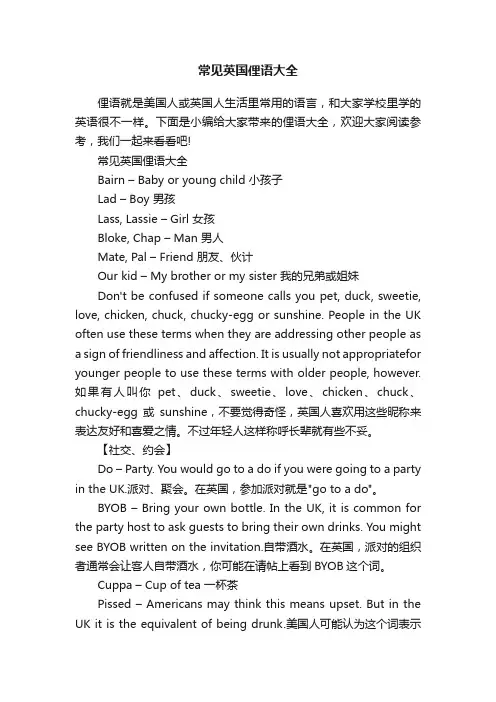
常见英国俚语大全俚语就是美国人或英国人生活里常用的语言,和大家学校里学的英语很不一样。
下面是小编给大家带来的俚语大全,欢迎大家阅读参考,我们一起来看看吧!常见英国俚语大全Bairn – Baby or young child 小孩子Lad – Boy 男孩Lass, Lassie – Girl 女孩Bloke, Chap – Man 男人Mate, Pal – Friend 朋友、伙计Our kid – My brother or my sister 我的兄弟或姐妹Don't be confused if someone calls you pet, duck, sweetie, love, chicken, chuck, chucky-egg or sunshine. People in the UK often use these terms when they are addressing other people as a sign of friendliness and affection. It is usually not appropriatefor younger people to use these terms with older people, however.如果有人叫你pet、duck、sweetie、love、chicken、chuck、chucky-egg或sunshine,不要觉得奇怪,英国人喜欢用这些昵称来表达友好和喜爱之情。
不过年轻人这样称呼长辈就有些不妥。
【社交、约会】Do – Party. You would go to a do if you were going to a party in the UK.派对、聚会。
在英国,参加派对就是"go to a do"。
BYOB – Bring your own bottle. In the UK, it is common for the party host to ask guests to bring their own drinks. You might see BYOB written on the invitation.自带酒水。
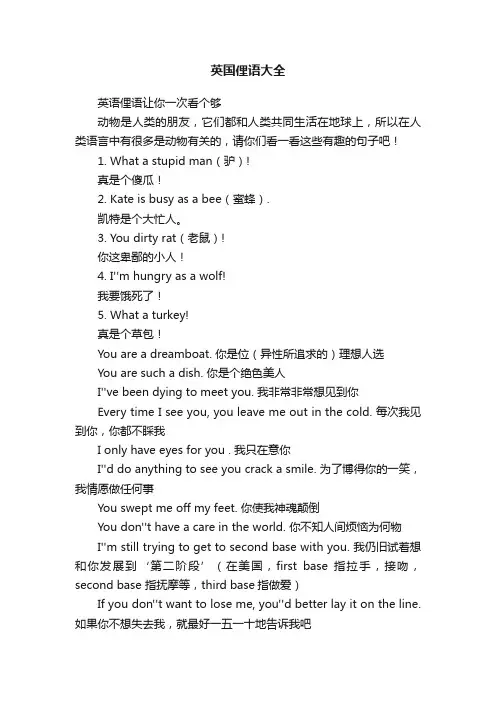
英国俚语大全英语俚语让你一次看个够动物是人类的朋友,它们都和人类共同生活在地球上,所以在人类语言中有很多是动物有关的,请你们看一看这些有趣的句子吧!1. What a stupid man(驴)!真是个傻瓜!2. Kate is busy as a bee(蜜蜂).凯特是个大忙人。
3. You dirty rat(老鼠)!你这卑鄙的小人!4. I''m hungry as a wolf!我要饿死了!5. What a turkey!真是个草包!You are a dreamboat. 你是位(异性所追求的)理想人选You are such a dish. 你是个绝色美人I''ve been dying to meet you. 我非常非常想见到你Every time I see you, you leave me out in the cold. 每次我见到你,你都不睬我I only have eyes for you . 我只在意你I''d do anything to see you crack a smile. 为了博得你的一笑,我情愿做任何事You swept me off my feet. 你使我神魂颠倒You don''t have a care in the world. 你不知人间烦恼为何物I''m still trying to get to second base with you. 我仍旧试着想和你发展到‘第二阶段’(在美国,first base 指拉手,接吻,second base 指抚摩等,third base指做爱)If you don''t want to lose me, you''d better lay it on the line. 如果你不想失去我,就最好一五一十地告诉我吧Tell me your story, I''m all ears. 告诉我你的故事,我洗耳恭听Someday, when your ship come in, you''ll build your dream house. 总有一天,当你有钱时,你会建造你梦想的家I hope your idea takes wing. 我希望你的想法成真I wish that you would put your cards on the table. 我希望你干脆把话挑明Have you ever seen your old flame? 你还见过你的旧情人吗If the shoe fits, wear it. 如果是真的就承认吧This experience will make me show my true color. 这种经历将使我暴露我的本性I have a bottomed-down mind. 我是个没有什么独到见解的人I have no direction, I just get wherever the wind blows. 我没有方向,只是随风到处飘I can''t burn the candle at both ends forever. 我不能永远这么过分地消耗精力We could make beautiful music together. 我们也许会是和谐幸福的一对儿You are always trying to get my goat. 你总是想惹我发火I''m a man of my word. 我是个讲信用的人Someday you''re going to have to face the music for your actions. 总有一天,你将不得不承担自己的行为所带来的后果Just cool your heels! 好了,安静会儿吧Save your breath! I don''t want to hear it. 不要说了,我不想听Really?? You are so bad! 真的吗?你真棒!!英语俚语是一种非正式的语言,通常用在非正式的场合,所以在用这些俚语是一定要考虑到所用的场合和对象,最好不要随意用这些俚语。
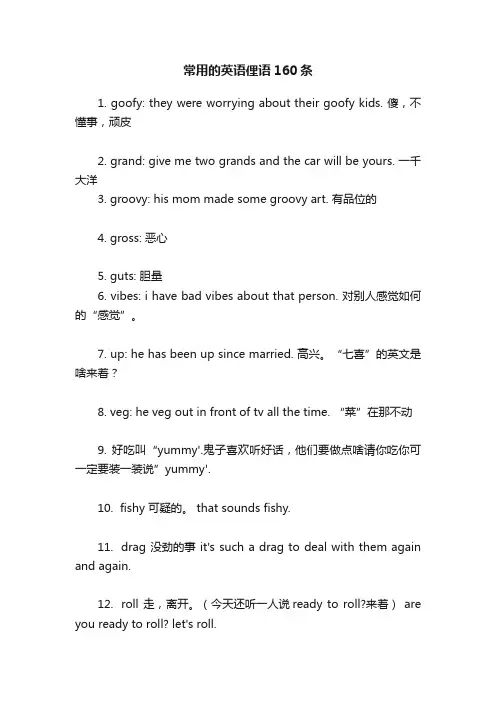
常用的英语俚语160条1. goofy: they were worrying about their goofy kids. 傻,不懂事,顽皮2. grand: give me two grands and the car will be yours. 一千大洋3. groovy: his mom made some groovy art. 有品位的4. gross: 恶心5. guts: 胆量6. vibes: i have bad vibes about that person. 对别人感觉如何的“感觉”。
7. up: he has been up since married. 高兴。
“七喜”的英文是啥来着?8. veg: he veg out in front of tv all the time. “菜”在那不动9. 好吃叫“yummy'.鬼子喜欢听好话,他们要做点啥请你吃你可一定要装一装说”yummy'.10. fishy 可疑的。
that sounds fishy.11. drag 没劲的事 it's such a drag to deal with them again and again.12. roll 走,离开。
(今天还听一人说ready to roll?来着) are you ready to roll? let's roll.13. nuts 疯 are you nuts? the trafic drives me nuts.14. freak out 紧张害怕 don't freak out if cops pull you over.15. rip off 骗了(钱了) i realized i was ripped off after payed $200 for these shoes.16. bug 讨厌 stop bugging me with your plan. i won't do it with you17 shrink =a psychotherapist 心理医生18 airhead =a silly. rather unintelligent person. his girlfriend is an airhead.19 a-yo 比较随便的打招呼,近似于'what' up?' 'hey!'20 buzz 打电话 give me a buzz when you reach home.31 bread =money. breadwinner 养家的人32 booty 屁股 check out her booty!33 boob 乳房34 cheesey 很没品味,很土corny the gift i receieved from ryan is cheesey.35 cig cigarette的缩写 you got a cig?36 crap =nonsense what he said is crap. don't believe a word of it.37 f-u-c-ked up 可以表达很多意思,比如“糟透了,笨死了” you are pretty f-u-c-ked up.38 freaky =weird he's a freaky guy.=he is a freak.39 flick =movie that was a good flick.40 get on (one's) nerves =to annoy you really get on my nerves.41 goof 笨蛋 goofy=silly42 hang out (和朋友)出去消遣43 hooker 妓女44 hot 迷人 man. that girl was hot! she is such a hottie!45 juicy 桃色八卦的 a juicy scandal46 jerk 粗蠢之人47 jerk off =to masturbate48 jackass “公驴”,说人就是“蠢驴”的意思, mtv台就有一档叫jackass的节目,专门表演一些无聊又愚蠢的玩意儿逗乐49 pimp 拉皮条的50 puke =vomit there's puke on the floor.51 pussy =vagina52 redneck (美国的)乡巴佬53 sassy =styling. 时髦的 those clothes are sassy!54 nifty 棒,一流的 here's a list of all-around nifty things that we've found over the years.55 screw up =err;mess up they screwed up that paint job. なwww.56 suck 讨厌,烦人final exams suck.57 twisted = displeasing; messed up that's twisted! twisted mind 奇思异想;怪脑筋58 meth methamphetamine的缩写,即“冰毒”59 tweaker =a person who uses meth60 mdma 摇头丸,也叫“ecstasy”61 pot =marijuana;joint 大麻烟62 crack 强效可卡因63 whiz 小便 i just took a whiz.64 gig =job i just do these gigs as a cover.65 dump 甩了某人(比如女朋友)66 get high 爽一下do you get high?67 p-i-s-s off68 get a crush on somebody 迷上某人69 thirtyish = thirty something 三十多岁的 70 bent =angryit's ok. don't get so bent. powered by , all rights reserved.71 booze = alcoholhe promised to bring two bottles of booze to the party.72 call =predictionthe weatherman made a good call about when the storm would come.73 chintzy =cheapthat really was a chintzy present you got him.74 cut out =leaveit is late. i have to cut out.75 dope -drugthere are a lot of dope dealers around here.76 freebie 免费品the pillow was a freebie77 get it =understandi listened to the joke twice. but i still don't get it.78 grubby = unclean and untidythose clothes are too grubby to wear to the party.79 hairy =dangerousthat was a hairy plane trip. i am glad the storm is over.80 fag 是'faggot'的简写,对同性恋男子的贬称81 street smart 知道在城市生活该怎么处置一些事情,应该如何应付各种不同的情况,比如如何保护自己。
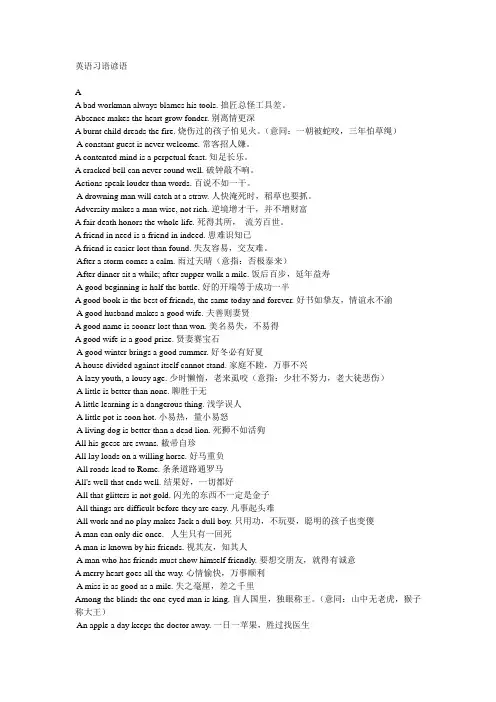
英语习语谚语AA bad workman always blames his tools. 拙匠总怪工具差。
Absence makes the heart grow fonder. 别离情更深A burnt child dreads the fire. 烧伤过的孩子怕见火。
(意同:一朝被蛇咬,三年怕草绳)A constant guest is never welcome. 常客招人嫌。
A contented mind is a perpetual feast. 知足长乐。
A cracked bell can never sound well. 破钟敲不响。
Actions speak louder than words. 百说不如一干。
A drowning man will catch at a straw. 人快淹死时,稻草也要抓。
Adversity makes a man wise, not rich. 逆境增才干,并不增财富A fair death honors the whole life. 死得其所,流芳百世。
A friend in need is a friend in indeed. 患难识知已A friend is easier lost than found. 失友容易,交友难。
After a storm comes a calm. 雨过天晴(意指:否极泰来)After dinner sit a while; after supper walk a mile. 饭后百步,延年益寿A good beginning is half the battle. 好的开端等于成功一半A good book is the best of friends, the same today and forever. 好书如挚友,情谊永不渝A good husband makes a good wife. 夫善则妻贤A good name is sooner lost than won. 美名易失,不易得A good wife is a good prize. 贤妻赛宝石A good winter brings a good summer. 好冬必有好夏A house divided against itself cannot stand. 家庭不睦,万事不兴A lazy youth, a lousy age. 少时懒惰,老来虱咬(意指:少壮不努力,老大徒悲伤)A little is better than none. 聊胜于无A little learning is a dangerous thing. 浅学误人A little pot is soon hot. 小易热,量小易怒A living dog is better than a dead lion. 死狮不如活狗All his geese are swans. 敝帚自珍All lay loads on a willing horse. 好马重负All roads lead to Rome. 条条道路通罗马All's well that ends well. 结果好,一切都好All that glitters is not gold. 闪光的东西不一定是金子All things are difficult before they are easy. 凡事起头难All work and no play makes Jack a dull boy. 只用功,不玩耍,聪明的孩子也变傻A man can only die once. 人生只有一回死A man is known by his friends. 视其友,知其人A man who has friends must show himself friendly. 要想交朋友,就得有诚意A merry heart goes all the way. 心情愉快,万事顺利A miss is as good as a mile. 失之毫厘,差之千里Among the blinds the one-eyed man is king. 盲人国里,独眼称王。
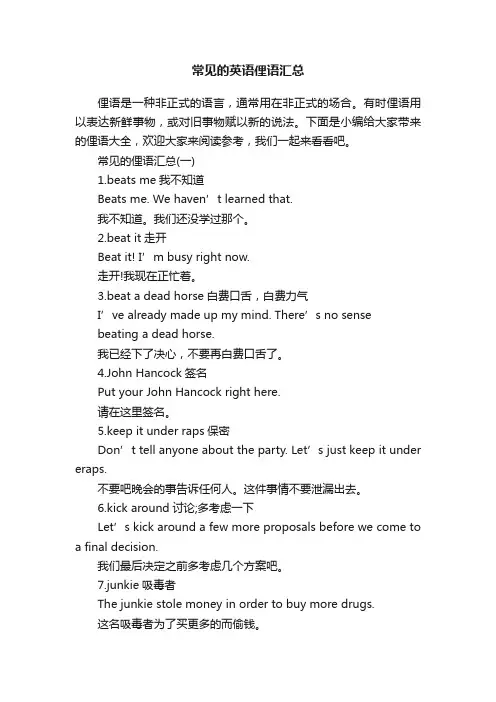
常见的英语俚语汇总俚语是一种非正式的语言,通常用在非正式的场合。
有时俚语用以表达新鲜事物,或对旧事物赋以新的说法。
下面是小编给大家带来的俚语大全,欢迎大家来阅读参考,我们一起来看看吧。
常见的俚语汇总(一)1.beats me我不知道Beats me. We haven’t learned that.我不知道。
我们还没学过那个。
2.beat it走开Beat it! I’m busy right now.走开!我现在正忙着。
3.beat a dead horse白费口舌,白费力气I’ve already made up my mind. There’s no sensebeating a dead horse.我已经下了决心,不要再白费口舌了。
4.John Hancock签名Put your John Hancock right here.请在这里签名。
5.keep it under raps保密Don’t tell anyone about the party. Let’s just keep it under eraps.不要吧晚会的事告诉任何人。
这件事情不要泄漏出去。
6.kick around讨论;多考虑一下Let’s kick around a few more proposals before we come to a final decision.我们最后决定之前多考虑几个方案吧。
7.junkie吸毒者The junkie stole money in order to buy more drugs.这名吸毒者为了买更多的而偷钱。
8.put away大吃大喝I’ve never seen anybody put away so much food and still look so thin.我从未见过这么能吃的人还这么瘦。
9.put a move on挑逗He tried to put the moves on her, but she turned him down.他想要挑逗她,但她拒绝了他。
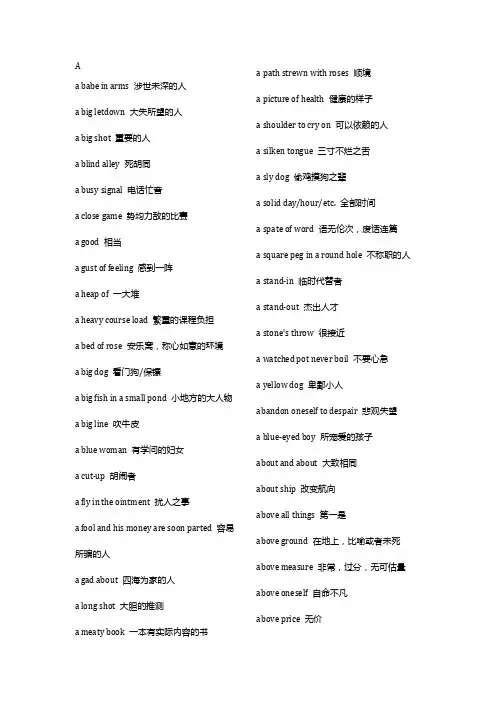
Aa babe in arms 涉世未深的人a big letdown 大失所望的人a big shot 重要的人a blind alley 死胡同a busy signal 电话忙音a close game 势均力敌的比赛a good 相当a gust of feeling 感到一阵a heap of 一大堆a heavy course load 繁重的课程负担a bed of rose 安乐窝,称心如意的环境a big dog 看门狗/保镖a big fish in a small pond 小地方的大人物a big line 吹牛皮a blue woman 有学问的妇女a cut-up 胡闹者a fly in the ointment 扰人之事a fool and his money are soon parted 容易所骗的人a gad about 四海为家的人a long shot 大胆的推测a meaty book 一本有实际内容的书a path strewn with roses 顺境a picture of health 健康的样子a shoulder to cry on 可以依赖的人a silken tongue 三寸不烂之舌a sly dog 偷鸡摸狗之辈a solid day/hour/etc. 全部时间a spate of word 语无伦次,废话连篇a square peg in a round hole 不称职的人a stand-in 临时代替者a stand-out 杰出人才a stone's throw 很接近a watched pot never boil 不要心急a yellow dog 卑鄙小人abandon oneself to despair 悲观失望a blue-eyed boy 所宠爱的孩子about and about 大致相同about ship 改变航向above all things 第一是above ground 在地上,比喻或者未死above measure 非常,过分,无可估量above oneself 自命不凡above price 无价above the rest 特别above-board 光明正大的absolute refusal 断然拒绝accession to treaty 加盟accommodate oneself to circumstances 遂于而安wizard 最能干的ace in the hole 最后的王牌act of God 天灾act out 实行act of fool 装傻act the loard 装阔after a fashion 勉强after a storm comes a calm 暴风雨过后的平静after is said and done 终归after hour 规定时间后(办公时间等)aim high 志向远大air oneself 到户外呼吸新鲜空气alibi 借口ask alibi 找借口alive with 洋溢,拥抱all a wit 兴奋着,神经过敏all aboard 各位请上车/船all bark and no bite 光说不做all better 完全康复all burn up 怒火如焚all fiction 想象的,虚构的all for it 完全同意all gone 希望等的消逝,物品等的丢失all here 很好,很正常(能力,精神等)all in the day's work 平凡的事情,不稀奇all is still 万籁俱静all lined up, all wind up,all set 一切准备好了all manner of 各色各样all my eye and Betty Martin.胡说八道all right for you 和你绝交all skin and bones 皮包骨all steam go 一切就绪,万事俱备all the better 更好了all the father 尽...所有/所能all the go 非常流行all the world and his wife 所有人all the worse 反而更坏all there 头脑清醒的all things to all men 八面玲珑all tire out 太疲惫all to the good 幸好all too often 太平常all too 太all turned out 如愿以偿all up 无望了,全完了all washed up 全完蛋了all wet 完全搞错了all you have to do 你最好allow for 考虑,体谅allow oneself in 沉溺almost always 通常alongside of 与...并排ambulance-chaser 怂恿受害者起诉的律师among the missing 下落不明an uphill battle 艰难的战斗and all that 诸如此类and how 当然啦,说得妙,是了,难道还有问题!and so forth 等等and that 而且and the some 而且,还远不止,至少and then 然后and what not 等等any yet 但是angel's visit 难得的客人,难得遇见的事物animated talk 畅谈another matter 另一回事another thing coming (to have ) 注定要到倒霉another time 下次answer back 回嘴answer for 负责,保证any and every 统统,全体any man alive 无论谁any old thing 什么都any old 任何...都any which way 四面八方anyhow and everyhow 随便anything under the sun 任何事情appeal to arms 诉诸武力anywhere near 根本are you telling me 用你来告诉我吗/要你来发好施令吗argue the toss 无聊争拗armchair quarterback 爱瞎指挥的人arrest one's eye 引人注目art and part 策划和参与as a general rule 一般说来as best one can 尽最大能力as best one may 尽力想方设法as broad as it is long 半斤八两as clay in the hand of the potter 得心应手as clear as crystal 十分清楚as clear as day 明若观火as clear as mud 不清晰,混乱as close as a clam 一毛不拔as cross as two sticks 非常生气as dry as bone 口渴as easy as ABC 很简单as faithful as dog 十分忠实as far as that goes 实际上as flickle as fortune 完全不可靠as firm as rock 坚如磐石as gentle as a lamb 性情温顺的as good as a play 非常有趣as good as one's promise 受约as good as one's word 受约as graceful as a swan 姿势优美的as is 照现在的样子,原样as life 宁愿as like as chalk and cheese 似是而非as many again as =as much again as 两倍于as matters stand 在现状下,按照目前状况as of 在...的时候,直到...之前as per 按照as plain as the nose on one's face (to be) 显而易见as poor as a church mouse 一贫如洗as soft as down 柔软如绒毛as soon 宁愿as sure as I'm alive 十分确实地as the case stands 事实上as the crows flies 笔直地as the day is long 终日as the saying goes 正如俗语所说的as the world goes 照习惯说as things are 按照目前状况as who should say 可谓,可以这样说as yet 至今还/尚/还as you please 随你意思as you were 复原ask no odds 不求照顾ask the way 问路asleep at the switch 玩忽职守/错过机会assume a new aspect 面貌一新at a blow 立即at a dash 一气呵成at a full jump 全速的at a /one stroke 立即/一举at all event 总之at anchor 停泊/抛锚at bay 陷入绝境at best 最好不过/充其量at call 随叫/随要at close hand 在近处/不远将来at cross purpose 目的相反at daggers drawn 势不两立/剑拨弩张at ease 自由自在at fault 出毛病/出故障at fewest 至少at first blush 乍看/一看at full blast 全速地/大规模地at heart 从内心上,本质上at home in/with 擅长at issue 争论at one heels 紧跟着at one word 马上at one's fingertips 了如指掌at one's own charge 自费at one's service 听候某人吩咐at random 随机at sight 一见就at table 在吃饭at the bottom of fortune's wheel 倒霉透顶at the end of one's rope 忍无可忍at the first face 乍一看at the longest 之多at the peak 最高价。
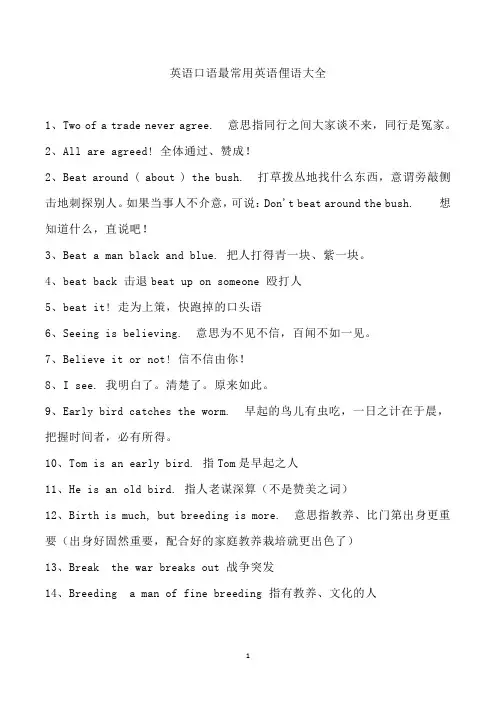
英语口语最常用英语俚语大全1、Two of a trade never agree. 意思指同行之间大家谈不来,同行是冤家。
2、All are agreed! 全体通过、赞成!2、Beat around ( about ) the bush. 打草拨丛地找什么东西,意谓旁敲侧击地刺探别人。
如果当事人不介意,可说:Don't beat around the bush. 想知道什么,直说吧!3、Beat a man black and blue. 把人打得青一块、紫一块。
4、beat back 击退beat up on someone 殴打人5、beat it! 走为上策,快跑掉的口头语6、Seeing is believing. 意思为不见不信,百闻不如一见。
7、Believe it or not! 信不信由你!8、I see. 我明白了。
清楚了。
原来如此。
9、Early bird catches the worm. 早起的鸟儿有虫吃,一日之计在于晨,把握时间者,必有所得。
10、Tom is an early bird. 指Tom是早起之人11、He is an old bird. 指人老谋深算(不是赞美之词)12、Birth is much, but breeding is more. 意思指教养、比门第出身更重要(出身好固然重要,配合好的家庭教养栽培就更出色了)13、Break the war breaks out 战争突发14、Breeding a man of fine breeding 指有教养、文化的人15、Lead a cat-and-dog life. 过着猫狗生活,特指感情恶劣的夫妇生活,经常吵架,水火不容。
16、A cat has nine lives. 猫有九命,指命大。
17、It is raining cats and dogs. 正大雨倾盆。
18、has a cat's sleep. 打盹,打瞌睡19、Shoot the cat. 饮酒过多而呕吐(口语)20、Every cloud has a silver lining. 意思为黑暗的背后就是光明,不用悲观。
英语口语俚语大全英语俚语是一种非正式的语言,通常用在非正式的场合,所以在用这些俚语是一定要考虑到所用的场合和对象,最好不要随意用这些俚语。
下面是小编给大家带来的俚语大全,欢迎大家来阅读参考,我们一起来看看吧。
关于英语俚语大合集(一)1.clock in 打卡Don't forget to clock in,otherwise you won't get paid.别忘了打卡,否则领不到钱。
e on to 对...轻薄;吃豆腐Tanya slapped Bill after he came on to her.Tanya在Bill对她轻薄之后打了他一巴掌。
e easily 易如反掌Languages come easily to some people.语言学习对有些人来说易如反掌。
4.don't have a cow别大惊小怪Don't have a cow! I'll pay for the damages.别大惊小怪的!我会赔偿损失的。
5.push around 欺骗Don't try to push me around!别想耍我!关于英语俚语大合集(二)1.keep one's shirt on保持冷静Keep your shirt on. He didn't mean to offend you. That's just theway he talks.保持冷静。
那只是他说话的惯常方式,他并非有意要冒犯你。
2.cool it冷静一点Cool it. You are making me mad.冷静一点。
你快把我逼疯了。
3.joy ride兜风Let's go for a joy ride.让我们去兜兜风。
4.rap说唱乐Do you like rap music? I have trouble understanding the words.你喜欢说唱音乐吗?我听不太懂其中的歌词。
英语俚语是一种非正式的语言,通常用在非正式的场合,所以在用这些俚语是一定要考虑到所用的场合和对象,最好不要随意用这些俚语。
下面是一些常用的俚语。
a bird in the hand is worth two in the bush 一鸟在手,胜似二鸟在林a blank slate 干净的黑板(新的一页,新的开始)a bone to pick 可挑剔的骨头(争端,不满)a cat nap 打个盹儿a ouch potato 躺椅上的马铃薯(懒鬼)a headache 头痛(麻烦事)a knock out 击倒(美得让人倾倒)a load off my mind 心头大石落地a pain in the neck 脖子疼(苦事)a piece of cake 一块蛋糕(小菜一碟,易事一件)a shot in the dark 盲目射击(瞎猜)a sinking ship 正在下沉的船a slap in the face 脸上挨了一耳光(公然受辱)a social butterfly 社交蝴蝶(善于交际,会应酬的人)a thorn in someone''s side 腰上的荆棘(芒刺在背)a turn coat 反穿皮袄的人(叛徒)a weight off my shoulders 放下肩头重担an ace up my sleeve 袖里的王牌ants in one''s pants 裤裆里有蚂蚁(坐立不安)back in the saddle重上马鞍(重整旗鼓)back on track重上轨道(改过自新)backfire逆火(弄巧成拙,适得其反)ball and chain 铁球铁链,甜蜜的枷(老婆)beat a dead horse 鞭打死马令其奔驰(徒劳)beaten by the ugly stick 被丑杖打过(生得难看)bet your life 把命赌上(绝对错了)better half 我的另一半big headed 大脑袋(傲慢,自大)bigger fish to fry 有更大的鱼要炸(有更重要的事要办)bite the bullet 咬子弹(强忍痛苦)birds of a feather flock together 羽毛相同的鸟总飞成一群(物以类聚)blow up in you face 在眼前爆炸(事情完全弄砸了)break a let 折断一条腿(表演真实,演出成功)break the ice 破冰(打破僵局)brown nose 讨好,谄媚bull in a china shop 瓷器店里的蛮牛(笨拙的人,动辄弄坏东西的人)burst your bubble 扎破泡泡(打破人的幻想,煞风景)bury one''s head in the sand把头埋在沙里(自欺欺人)butterflies in my stomach肚里有只蝴蝶(心里紧张,七上八下)buy the farm买下农场(归道山,死了)cash in my chips兑换筹码(睡觉,就寝)circle the wagons把篷车围成一圈(严阵以待)clean up one''s act自我检点,自我改进come down in sheets整片整片地下(倾盆大雨)cross the line 跨过线(做得太过分了)cross that bridge when we come to it 到了桥头就过桥(船到桥头自然直)cut to the chase 抄捷径去追猎物(不绕圈子,开门见山,单刀直入)daily grind 例行苦事,每天得干的苦工days are numbered 来日无多dead center 正当中dead-end street 死路,死巷子domino effect 骨牌效应down to the wire 最后关头down under 南边(常指面半球的澳洲)downhill from here 从此都是下坡路(自此每况愈下)drop the ball 掉了球(失职)empty nest 空巢(儿女长大离家)get hitched 拴起来(结婚)get off on the wrong foot 起步便错(第一印象不佳)get the ball rolling 让球滚起来(动起手来)goose bumps 鸡皮疙瘩hit the road 上路hold your horses 勒住你的马(慢来)hang somebody out to dry 把……晾起来了(把……坑苦了)in one''s back pocket 在某人裤子后口袋里(是某人的囊中之物)in the dark 在黑暗中(茫然,什么也不知道)in the spotlight 站在聚光灯圈里(出风头)it''s Greek to me 希腊文(天书)joined at the hip 连体婴(死党,从不分开的两个人)jump the gun 枪未响先偷跑(抢先)kick the bucket 踢水桶(翘辫子)kill two birds with one stone一箭双雕,一举两得last straw 最后一根稻草left a bitter taste in one''s mouth 留下满嘴苦味(留下不愉快的回忆)light a fire under your butt 在屁股下点一把火(促其行动)light at the end of the tunnel 隧道末端的光(一线希望)like shooting fish in a barrel 桶里射鱼(瓮中捉鳖)ling winded 长舌,碎嘴Monday morning quarterback 星期一早晨的四分卫(马后炮)my old man 我的老头(我父亲)out of the pan and into the fire 跳出锅里,掉进火里(每况愈下)plenty of other fish in the sea 海里的鱼多得很(天涯何处无芳草)poker face 扑克面孔(喜怒不形于色)pop the question 提出大问题(求婚)pot calling the kettle black 锅嫌壶黑(五十步笑百步)punch your lights out 揍得你两眼发黑put all of one''s eggs in one basket 鸡蛋都放在一个篮子里(孤注一掷)put one''s foot in one''s mouth 把脚丫放进嘴里(说错话了)rob the cradle 劫摇篮(老牛吃嫩草)skate on thin ice 在薄冰上滑冰(如履薄冰,身历险境)skeleton in one''s closet 壁橱里的骷髅(不可告人的事)skin and bones 皮包骨sleep on it 睡在上面(考虑一晚上)small talk 寒喧,闲聊smooth sailing 一帆风顺stab in the back 背后插刀(遭人暗算)stallion 千里驹(貌美体健的男人)stud 种马(貌美体健的男人)swing for the fence 打全垒打take a hike 走路(滚蛋)until you are blue in the face 干到脸发青(也是白干)unwind 放松发条(轻松下来)up for grabs 大家有份up in the air 挂在空中(悬而未决)when hell freezes over 地狱结冰(绝不可能的事)weed out 除去杂草(淘汰)well rounded全能,全才when pigs fly 猪飞的时候(绝不可能)not lift a finger 连手指都不动一动(袖手旁观)wrapped around his/her little finger 化为绕指柔(玩弄于股掌之间)最新文件---------------- 仅供参考--------------------已改成-----------word文本--------------------- 方便更改赠人玫瑰,手留余香。
常用的英语俚语汇总俚语是英语中的重要组成部分,是由人们在日常中总结出来的具有精炼,幽默等特点的词语。
下面小编整理了常用的英语俚语,欢迎大家阅读。
常用的英语俚语摘抄cash in my chips兑换筹码(睡觉,就寝)circle the wagons把篷车围成一圈(严阵以待)clean up one's act自我检点,自我改进come down in sheets整片整片地下(倾盆大雨)cross the line 跨过线(做得太过分了)cross that bridge when we come to it 到了桥头就过桥(船到桥头自然直)cut to the chase 抄捷径去追猎物(不绕圈子,开门见山,单刀直入)daily grind 例行苦事,每天得干的苦工days are numbered 来日无多dead center 正当中dead-end street 死路,死巷子domino effect 骨牌效应down to the wire 最后关头down under 南边(常指面半球的澳洲)downhill from here 从此都是下坡路(自此每况愈下)drop the ball 掉了球(失职)empty nest 空巢(儿女长大离家)get hitched 拴起来(结婚)get off on the wrong foot 起步便错(第一印象不佳)get the ball rolling 让球滚起来(动起手来)goose bumps 鸡皮疙瘩hit the road 上路hold your horses 勒住你的马(慢来)hang somebody out to dry 把……晾起来了(把……坑苦了)in one''s back pocket 在某人裤子后口袋里(是某人的囊中之物) in the dark 在黑暗中(茫然,什么也不知道)in the spotlight 站在聚光灯圈里(出风头)it''s Greek to me 希腊文(天书)常用的英语俚语推荐out of the pan and into the fire 跳出锅里,掉进火里(每况愈下) plenty of other fish in the sea 海里的鱼多得很(天涯何处无芳草) poker face 扑克面孔(喜怒不形于色)pop the question 提出大问题(求婚)pot calling the kettle black 锅嫌壶黑(五十步笑百步)punch your lights out 揍得你两眼发黑put all of one''s eggs in one basket 鸡蛋都放在一个篮子里(孤注一掷)put one''s foot in one''s mouth 把脚丫放进嘴里(说错话了)rob the cradle 劫摇篮(老牛吃嫩草)skate on thin ice 在薄冰上滑冰(如履薄冰,身历险境)skeleton in one''s closet 壁橱里的骷髅(不可告人的事)skin and bones 皮包骨sleep on it 睡在上面(考虑一晚上)small talk 寒喧,闲聊smooth sailing 一帆风顺stab in the back 背后插刀(遭人暗算)常用的英语俚语精选joined at the hip 连体婴(死党,从不分开的两个人)jump the gun 枪未响先偷跑(抢先)kick the bucket 踢水桶(翘辫子)kill two birds with one stone一箭双雕,一举两得last straw 最后一根稻草left a bitter taste in one''s mouth 留下满嘴苦味(留下不愉快的回忆)light a fire under your butt 在屁股下点一把火(促其行动)light at the end of the tunnel 隧道末端的光(一线希望)like shooting fish in a barrel 桶里射鱼(瓮中捉鳖)ling winded 长舌,碎嘴Monday morning quarterback 星期一早晨的四分卫(马后炮)my old man 我的老头(我父亲)。
英语俚语大全200个不论是与歪果友人日常交流,还是托福听力刷题中,常常出现会一些俚语,单词都认识,就是不明白什么意思。
本站精心为大家整理了英语俚语大全200个,希望对你有帮助。
英语俚语大全200个A bad beginning makes a bad ending.不善始者不善终。
A bad thing never dies.遗臭万年。
A bad workman always blames his tools.不会撑船怪河弯。
A bird in the hand is worth than two in the bush.一鸟在手胜过双鸟在林。
A boaster and a liar are cousins-german.吹牛与说谎本是同宗。
A bully is always a coward.色厉内荏。
A burden of one's choice is not felt.爱挑的担子不嫌重。
A candle lights others and consumes itself.蜡烛照亮别人,却毁灭了自己。
A cat has 9 lives.猫有九条命。
A cat may look at a king.猫也可以打量国王,意为人人平等。
A close mouth catches no flies.病从口入。
A constant guest is never welcome.常客令人厌。
Actions speak louder than words.事实胜于雄辩。
Adversity leads to prosperity.穷则思变。
Adversity makes a man wise, not rich. 逆境出人才。
A fair death honors the whole life.死得其所,流芳百世。
A faithful friend is hard to find.知音难觅。
A fall into a pit, a gain in your wit.吃一堑,长一智。
地道英语句典A-Z #241-250古今中外唯一地道美语实用句子中英对照总汇(某些地道英语措辞可能不雅或冒犯,请读者原谅和自行选择)*那(候选人的)1(成功机会全部丧失)2一旦他还是结婚时(跟一个妓女有恋情)3的(丑闻)4 (上了头条新闻)5: The candidate’s1 (goose was cooked)2 once the scandal4 (hit the headlines)5 that he was (romantically involved with a prostitute)3 while still married.*他对他的儿子说: “(营运饭店)1是个(高度竞争性)2的(生意)3但我们将会(合作来做)4 (使它成功/ditto)5.”: He said to his son: “(Operating a restaurant)1 is a (highly competitive)2 business3, but we will (work together)4 to (make it fly/make it work/make it a success)5.”*一件(度身定做/ditto)1的(西装)2应该比较一件(现成/ditto)3的西装(更合身)4, 但它一般也会(更昂贵)5: A (custom-made/tailored)1 suit2 should (fit better)4 than a (ready-made/off-the-shelf)3 suit, but generally it would also (cost more)5.*他对他的(百万富翁朋友)1说: “(我真的不能够相信)2, 像你的(成功人士)3不能够(借仅不过的一千块钱给我)4: He said to his (millionaire friend)1: “(I don’t believe it)2. A (big timer)3 like you cannot (loan me a mere thousand dollars)4.”*他(在互联网上)1(销售)2(缺乏趣味笑话T-恤)3的(致富计划)4(不能成功)5, 现在他要回去 ({他的九至五写字台职位}6a/{为办公室的人}6b): His (get-rich scheme)4 of marketing2 (bad-joke T-shirts)3 (over the internet)1 (did not pan out)5, and now he has to go back to ({his 9 to 5 desk job}6a/{be an office cubicle dweller}6b).*那有(本地)1(身处要职的人)2和(名人)3(出席)4的(筹款盛宴派对)5是(巨大的成功/ditto)6 (筹到)7两百万块钱给(儿童医院)8: The (fundraising gala)5 that was attended4 by local1 dignitaries2 and celebrities3 was a (runaway success/roaring success/howling success)6 in raising7 $2 million for the (Children’s Hospital)8.*那(发展蓬勃/ditto)1的(网球明星)2在事业(正在成功/ditto)3之际(突然退休)4他并(引述)5 (工作过分导致倦怠)6是(主要原因)7: The (blossoming/blooming)1 (tennis star)2 (abruptly retired)4 just as his career was (taking off/doing well/flourishing)3, and he cited5 burnout6 as the (main reason)7.*在这(未开发的小国家)1(做生意)2(采取)3(碰运气的手法)4, 成功(最多)5是({零星}6a/{没有定规}6b/{不一致}6c): (Doing business)2 in this (undeveloped little country)1 takes3 a (hit-and-miss approach)4, and success is ({spotty}6a/{random}6b/ {inconsistent}6c) (at best)5.*他(安慰)1他的儿子在(奥林匹克)2(输掉)3一个(紧凑赛跑)4之后: “(不要垂头丧气)5, 儿子, 在奥运(赢取银牌)6是(很好的成就/ditto)7.”: He consoled1 his son who had just lost3 a (close race)4 in the Olympics2: “(Cheer up)5, son. (Winning a silver medal)6 in the Olympics is (nothing to sneeze at/no small feat/a great accomplishment)7.”*在 (讨论)1什么(使他最高兴)2关于他的(教书职业)3, 那(教授)4说: “我(目击)5我的学生(在我照顾下/ditto)6(灿烂地成长)7是(有满意感觉)8.”: In discussing1 what (pleased him the most)2 in his (teaching career)3, the professor4said: “It’s gratifying8 towitness5 my students blossom7 (under my wing/under my wings)6.”*这(没有排名为种子球员的)1 (意料之外的连续成功[意])2继续在法国网球公开赛以(打败)3另一个(种子球员)4下(前进去)5(总决赛)6: This (unseeded player’s)1 (Cinderella run)2 continues in the French Open by (knocking off)3 another (seeded player)4 to (advance to)5 the final6.*他说: “我(有直觉)1这(不会失败/ditto)2的(计划)3将会({成功/ditto}4a/{无疑的成功}4b)我将会(富有)5(超越我最离奇的)6({梦想}7a/{幻想}7b).”: He said: “I (have a gut feeling)1 this (foolproof/sure-fire)2 project3 is going to ({work/click/fly/be successful}4a/{be a slam dunk}4b) and I’ll be rich5 (beyond my wildest)6 ({dream}7a/{imagination}7b).”*他说: “(聘请员工决定)1不应该是(听由侥幸)2, 我们({有超卓成功率}3a/{有证实了成功记录}3b)的(人力资源/ditto)4({专家/ditto)5可以协助.”: He said: “(Hiring decisions)1shouldn’t be (left to chance)2, and our (HR/Human Resources)4 (specialists/ professionals/experts)5 with ({a remarkably high batting average [note: “batting average” is baseball slang] of success}3a/{a proven track record of success}3b) can help.”*他说: “因为他永远没有(尽努力/ditto)1去(成为成功)2我可以(很极大可能准确地)3({说}4a/ {断定}4b)他是({无药可救}5a/ {注定失败/ditto}5b).”: He said: “It’s safe3 for me to ({say}4a/ {conclude}4b) he ({is a hopeless case}5a/{is a lost cause/is doomed to failure/is destined to failure/will never amount to anything}5b) because he never (works at it/puts in the efforts)1 to (be a success)2.”*(多年前)1我很多(同事)2(选择/ditto)3(放弃)4他们(安稳的银行职位)5(转到/ditto)6有(巨大成功潜力/非常成功)7的(互联网/ditto)8(社会组合部分)9: (Years ago)1 many of my colleagues2 (chose/elected/ opted)3 to (give up)4 their (secure jobs in banks)5 and (switched/changed)6 to the (high-flying/ditto)7 (dot-com/ internet)8 sector9.*(有决心)1, ({有信心}2a/{镇定自信}2b), ({有推动力/ditto}3a/ {有成功野心}3b), 这个(有成就)4的(总裁)5(经过很多困难)6来达到(今天她的成就)7: Determined1, ({confident}2a/ {poised}2b) and ({motivated/ driven}3a/{ambitious}3b), this accomplished4 CEO5 (has come a long way)6 to become (who she is today)7.*这(倾向支持顾客)1, (具创造性)2, 和({有远见}3a/{有远见和想象力}3b)的(无名运作)4 (具备)5(所有标志)6成为(行业)7下一个(环球强大有效者)8: This customer-oriented1, innovative2, and ({farsighted}3a/{visionary}3b) (no-name operation)4 bears5 (all the hallmarks)6 of the next (global powerhouse)8 of the industry7.*我的(侄儿)1(叹息)2地说: “我已经找了六个月我(甚至)3一个(面试)4也没有. 我永远不会找到一份工作的了.”我说: “不要(放弃)5, (有志者事竟成)6.”: My little nephew1 sighed2and said: “I’ve been looking for six months and I can’t even3 get an interview4. I’ll never find a job” I said: “Don’t (give up)5. (Where there’s a will, there’s a way)6.”*她对那个(快将退休的人)1说: “你的孩子(现在/ditto)2一定是(完全长大成人)3了, 是吗?” 他回答道: “我是(晚年开花的人)4我那(三个孩子是二, 四和六岁)5.”: She said to the (soon-to-be retiree)1: “Your kids must be (all grown up)3 (now/by now)2, isn’t it?” He replied: “I’m a (late bloomer)4 and my (three kids are two, four and six)5.”*我说: “他的公司({发生了什么}1a/{怎么样}1b)?”他说: “(上一次我听到)2它({还在营业/ditto}3a/{生意蓬勃成功/ditto}3b/{已经倒闭了/ditto}3c).”: I said: “({What happened to}1a/{How is}1b) his company?” H e said: “(Last time I heard)2 it ({was very much a going concern/was very much alive and kicking}3a/ {was doing bumper business/ was doing booming business}3b /{had gone belly up/had bankrupted/had gone bankrupt/ was out of business/had gone bust/had gone under/had gone tits-up[犯]}3c).*他的朋友说: “(私下的意见)1我(认为)2你的(生意主意)3是(不实际)4永远不会({有任何成就}5a/{成功/ditto}5b/{有渴求的效果}5c/{受到广泛接纳}5d).”: His friend said: “Personally1 I think2 your (business idea)3 is impractical4 and would never ({amount to anything}5a/{take off/fly high/succeed}5b/{work}5c/ {catch on}5d).”*(赢取)1(诺贝尔奖)2(增加)3(另一个)4({值得骄傲}5a/{给与他人深刻印象}5b)({光荣的成就在他的记录[意]/ditto}6a/{奖品在他的壁炉架}6b/{杰出事业的里程碑}6c): Winning1 (the Nobel Prize)2 added3 another4 ({proud}5a/{impressive}5b) ({feather in his cap/gold star in his résumé}6a/{trophy to his mantel}6b/{milestone to his illustrious career}6c).*(投资)1在(购买一岁纯种马)2 (像赛马本身一样是赌博)3, 因为很多这些(充满希望)4有(极好血统)5的(年轻动物)6会({不能成功}7a/{永远不会成功去真正的比赛}7b): Investing1 in the (purchase of thoroughbred yearlings)2 is (as much a gamble as horseracing itself)3, because many of these promising4 younglings6 with (magnificent pedigree)5 will ({fall by thewayside}7a/{never make it to a real race}7b).*(第一种籽)1的(网球球员)2在西班牙(公开赛)3(做出)4(又一个)5(占尽优势)6的(表现成绩)7(在过程中)8(没有输过一盘赛事)9下(全胜)10来(夺取)11(锦标/ditto)12: The (#1 seeded)1 (tennis player)2 delivered4 another5 dominant6 performance7 in the Spanish Open3, and swept10 to take11 the (Cup/championship)12 (without losing a set)9 (on the way)8.*他说: “我们新的(总裁)1({有优秀的表现记录}2a/{有成功的事业}2b/{曾经非常成功[意]}2c)我们有({绝对的}3a/{毫不动摇的}3b)(信心)4他一定会(领导)5我们(上兴旺的道路)6.”: He said: “Our new CEO1 ({has a sterling track record}2a/{has a successful career}2b/{has been to the top of the mountain}2c), and we have ({every}3a/ {unwavering}3b) confidence4 he will lead5 us (to the road of prosperity)6.”*(教授)1(建议)2他的(学生)3: “(像你们)4(富天才)5的(年轻人)6应该(不论需要怎么做)7 (尽最大努力/ditto)8去({在你选择的专业创做出成就}9a/{在这世界留下足迹}9b/{在这世界做出有影响的转变}9c).”: The professor1 advised2 his students3: “Talented5 (young men)6 (like you)4 should (do your best/do your utmost)8 to ({make your mark [note: not “mark s”] in your chosen field}9a/{leave your footprint in this world}9b/{make a difference in this world}9c), (no matter what it takes)7.”*他说: “这(石油)1(有财有势者/ditto)2因在(油泵)3({操纵}4a/ {串通}4b)(价格)5与(政府监管官)6({有麻烦}7a/{被调查}7b).” 他的朋友说: “这男士(有权势)8(政治)9的(关系)10, 时常能够(设法成功脱离)11(麻烦/ditto)12.”: He said: “This oil1(mogul/tycoon/magnate)2 is ({in trouble with}7a/{under investigation by}7b) the regulators6 for price5 ({manipulation}4a/ {collusion }4b) at the (gas pump)3.” His friend said: “This guy has powerful8 political9 connections10 and always been able to (negotiate his way out of)11 (trouble/a bind)12.”*他说: “在(建立那生意)1(多年之中)2我的(伙伴)3跟我有很多(充满难堪的吵闹)4, 但当我们(手持着被收购的巨大丰厚支票)5(露齿开怀而笑)6时({一旦成功其间怨恨都烟消云散}7a/{成功有特殊方法治愈旧伤}7b): He said: “My partner3 and I had many (bitter fights)4 (over the years)2 in (building the business)1, but ({all’s well that ends well}7a/{success has a way of healing old wounds}7b) when we (held our big fat buyout checks in our hands)5 and (grinned from ear to ear)6.”*很多(国际公司)1(已经采取步骤)2来(发展)3印度的({增长蓬勃/ditto}4a/{增长迅速/ditto}4b)(市场)5, 但只有(很少/ditto)6能够(涉水般艰辛走过)7(法律)8, (管制)9和(实践)10 (挑战)11的(迷宫)12(在本地)13 (成功/ditto)14: Many (international companies)1 (have taken steps)2 to develop3 the ({booming/thriving}4a/ {burgeoning/fast-growing}4b) markets5 of India, but only (a few/a handful of them)6 are able to (wade through)7 the maze12 of legal8, regulatory9 and practical10 challenges11 and (make it big/be successful/ succeed)14 locally13.*他说: “我(达到成功出人头地)1的(达到目的策略)2是({引人注目}3a/{推销自己/ditto}3b), 所以如果我({为公司做到一些好事}4a/{从满意的顾客得到赞扬}4b/{在处理生意中得到赞美的评语}4c)我会(在人们得知下做出)5(让管理层知道关于它)6.”: He said: “My (game plan)2 to (get ahead)1 is ({to be visible}3a/{to sell myself/to promote myself}3b), and therefore if I ({do something right for the company}4a/{get kudos from satisfied customers}4b/{receive laudatory comments anywhere in conducting business}4c) I (make a point of)5 (letting management know about them)6.”*他说: “我(永远不能够了解)1为什么我的老板(做到那么有钱)2, (鉴于)3他的(生意决定)4是那么(愚蠢)5(甚至我可能做得更好)6.”我说: “({你不能够跟成功有异议}7a/{成功响亮地表达}7b), 如果你比较他(更精明)8(为什么/ditto)9(他是亿万富翁而你不是)10?”: He said: “I (can never understand)1 why my boss (gets to be so rich)2, considering3 his (business decisions)4 are so dumb5 (even I could have done better)6.” I said: “({You cannot argue with success}7a/{Success speaks volumes [note: not “volume”]}7b), and if you’re smarter8 than him, (how come[口]/how comes)9 (he’s a billionaire and you’re not)10?”城: (~市) city; (~堡) castle*我们住在一个(炎热)1, (潮湿)2, (邋遢/ditto)3, 和(污染)4的(城市)5: We live in a city5 that is hot1, humid2, (dirty/filthy)3 and polluted4.*(游客)1(形容)2这的城市为一个(罪案控制)3, (流浪汉出没)4, (垃圾散布)5和(不好客)6的(可怖地方)7: Tourists1 describe2 this city as a crime-ridden3, homeless-infested4, garbage-strewn5 and inhospitable6 hellhole7.呈: (~献) to present; (~现) to exhibit*这个({宗教}1a/{极端宗教}1b) (狂热者)2是那么(沉迷于)3他的(信仰)4他({拒绝考虑}5a/{拒绝接受}5b)任何(呈献的)6 (证据)7(支持/ditto)8(进化论)9: This ({religious}1a/{devout}1b) fanatic2 is so (deep into)3 his belief4 that he ({shuts hismind}5a/{refuses to accept}5b) any evidence7 presented6 (supporting/in support of)8 evolution9.程: (规~) established rules; (~序) process; (~度) degree; (路~) route*(新选的政府)1有一套(改革)2和(繁荣)3的(议程)4: The (newly elected government)1 has an agenda4 for reform2 and prosperity3.*(他极爱她)1, (那程度/ditto)2 (只要她点头)3便(准备)4去(跟她结婚)5: (He loves her dearly)1, (so much so/to such an extent that)2 he is prepared4 (to marry her)5 (if only she gives him the nod)3.*(工厂)1(同意)2(实施)3几个(程序)4(针对)5(防止)6(将来)7的(性骚扰)8: The factory1 agreed2 to implement3 a number of programs4 (aimed at)5 preventing6 (sexual harassment)8 (in the future)7.*这(以牙还牙)1的(过程)2(恶化/ditto)3为两个国家(全力以赴的)4(贸易争斗)5: This tit-for-tat1 process2 (worsened/ deteriorated/degenerated)3 into an (all out)4 (trade war)5 between the two countries.*一张去香港 ({来回旅程}1a/{单程}1b)(飞机票)2(要花费)3 (接近)4两千块钱: A ({round-trip}1a/{one-way}1b) (plane ticket)2 to Hong Kong costs3 (close to)4 $2,000.*这(建筑工程)1应(头三年)2(付清开办的投资)3, 以后什么都(将全部会是得益)4: This (construction project)1 should (pay for the initial investment)3 in the (first three year)2 and anything after that (would be all gravy)4.*孩子们有(很长的记忆力)1, (确定)2你(大大程度地)3(递交)4 (你所承诺他们的)5: Children have (long memories)1, and (make sure)2 you deliver4 (what you promise them)5 (in spades)3.*他说: “我将(会坐飞机飞)1(直达/ditto)2北京, 但在我的(回程/ditto)3将会(经过)4香港.”: He said: “I’m flying1 (straight/ directly/nonstop)2 to Beijing, but will (pass through)4 Hong Kong on my (way back/return trip)3.”*他说: “年轻时我会为({赢取/ditto}1a/ {感动}1b/{讨好}1c) (我所爱女孩子)2(做到任何程度的事)3.”: He said: “When I was young I would (go to any length)3 to ({win/get}1a/ {impress}1b/{please}1c) (the girl I loved)2.”*那公司的(规范运作程序)1是(好好地记录写在)2一本(手册)3给它的(员工)4来(跟随)5: The company’s (standard operating procedures)1 are well-documented2 in a manual3 for its staff4 to follow5.*他说: “这里所有的(员工)1都(很乐意/ditto)2(引导)3(新员工/ditto)4 (这里周围)5(做事的适当程序/ditto)6.”: He said: “All the staff1 here are (too happy/ pleased)2 to show3 our (recruits/new employees)4 the (ropes [note: not “rope”]/proper procedures)6 (around here)5.”*那(律师)1(忠告)2(当事人)3: “那(诉讼程序)4({演变直到结束}5a/{要经历适当过程}5b)那很(可能)6(需要两三年)7.”: The lawyer1 advised2 his client3: “It probably6 (takes two to three years)7 for the (litigation process)4 to ({play it out}5a/ {take its due course}5b).”*他对她说: “我每天上班时都开车(经过/ditto)1你的屋子, 明天早晨你需要我可以({送你一程/ditto}2a/{载你上车}2b).”: He said to her: “I drive (past/by)1 your house everyday on my way to work, and I can ({give you a ride/give you a lift}2a/ {pick you up}2b) tomorrow morning if you want.”*他说: “我们可以(尽我们所能)1(推理)2和(辩论)3但都(不能代替)4(真正)5(经过过程)6来(制造出一个模型)7去看那(创新构想怎么样运作)8.”: He s aid: “We can theorize2 and debate3 (all we want)1 but (there’s no substitute)4 for actually5 (going through the process)6 of (producing a prototype)7 to see how the (innovative idea works)8.”*(在某程度/ditto)1上(周末)2(因雨取消)3的(棒球联赛)4不是完全(损失/ditto)5因为我们有机会去(喝些啤酒)6和({互相补充关于对方的新消息}7a/{闲谈一下/ditto}7b): (In a sense/ In a way/In a sort of way)1 the rained-out3 (baseball tournament)4 last weekend2 was not a complete (washout/ loss)5 because we got a chance to (drink some beer)6 and ({catch up with one another}7a/ {shoot the breeze with one another/shoot the bull with one another/pass the time of day with one another/chat a little with one another}7b).丞: (~) deputy [古](China official)承: (~担) to shoulder; (继~) inherit*我们的(城市)1对(提议)2 (重建)3(市中心)4的(工程)5的 (保持)6(没有作出承诺)7: Our city1 remains6 non-committal7 to the proposed2 project5 of rebuilding3 the (downtown core)4.*从他(近来)1(乱花钱作风)2来(判断)3, 他一定({承继了很多钱/ditto}4a/{发财了}4b): Juding3 from (the way he has been throwing money around)2 recently1, he must ({have come into a lot of money/have inherited a great deal of money}4a/{be in the money}4b).*他说: “(生活的)1(其他要承担的责任)2(制止我/ditto)3(追随)4(成为音乐家)5我的(梦想)6.”: He said: “Life’s1 (other commitments)2 (have stopped me from/have kept me from)3 pursuing4 my dream6 (as a musician)5.”*他说: “关于(新员工)1(不可靠的工作习惯)2你是对的, (我承认你指出我的错误是对的/ditto)3.”: He said: “You’re right about the (unreliable work habits)2 of (new recruits)1. (I stand corrected/I admit what you said is right and I am wrong)3.”*我们(未来的世世代代)1要在(将来多年)2(承受)3我们今天(破坏自然环境)4的(不负责任错误)5: For (years to come)2, our (future generations)1 will be (paying for)3 our (irresponsible mistakes)5 today in (ruining the environment)4.*她对她的男朋友说: “(我要承认你的)1, (你做的菜)2是(非常出色)3但我甚至不知道(你懂做菜)4”: She said to her boyfriend: “(I have to hand it to you)1. (Your cooking)2 is sensational3, but I don’t even know (you can cook)4.”*有些公司(在困境时)1给员工(莫大的/ditto)2(承诺)3, 但(好转时/ditto)4很快就(食言/ditto)5: Some companies promise3 employees (the sky/the world)2 when (times are tough)1, but are quick to (renege/go back on their words/break their promises/ crap out)5 when they (turn the corner/are over the hump)4.*他对他的哥哥说: “你说我永远不会(戒酒)1, 告诉你什么, 我将会在(接着的六个月)2(一滴的)3(酒/ditto)4也(将不会沾)5(令你低声下气地承应你是错的)6.”: He said to his brother: “You said I would never (quit drinking)1. Tell you what. I (will not touch)5 (a drop of)3 (alcohol/liquor)4 for the (next six months)2 and (make you eat your words)6.”*在(市长竞逐/ditto)1中(现任者)2在百分之八十五(选票点过)3后(挑战者)4以({宽阔}5a/ {不能克服}5b)的(幅度)6(领先)7下(承认失败)8: In the (mayoral race/mayor’s race)1 the incumbent2 (conceded defeat)8 after 85% of the (votes were counted)3 and the challenger4 was leading7 by a ({wide}5a/{prohibitive}5b) margin6.澄: (~清) crystal clear (water) or to clarify matters*那公司(举行)1(记者招待会)2来对(没有根据的)3(收购)4(谣言)5(澄清误会)6: The company held1 a (news conference)2 to (clear the air)6 on an unsubstantiated3 takeover4 rumor5.*那(著名优越女歌手)1对关于她(即将)2(跟中学爱人结婚)3的(谣言)4(走出来)5(澄清错误)6: The diva1 (came out)5 to dispel6 a rumor4 that she (was about to)2 (marry her high-school sweetheart)3.*可能一个完全的({调查}1a/{公开调查}1b)会(澄清/ditto)2什么是(损害)3我们的({保健}4a/ {教育}4b)(制度)5: Maybe a full ({investigation}1a /{public enquiry}1b) would (shed light on/clarify)2 what ails3 our ({health}4a/{education}4b) system5.*一个(政府财务部门)1的(代言人)2说: “(政府)3(希望)4(澄清)5一些(媒体)6(提供/ditto)7关于(税制改革)8(详情)9之(迷惑)10 (错误消息)11.”: A spokesperson2 from the (Finance Ministry)1 said: “The Government3 wishes4 to clarify5 confusing10 misinformation11 (put out/ provided)7 by some media6 on the details9 of the (tax reform)8.”橙: (~) orange tree; (~) orange color♦橙色: orange color♦橙子: orange惩[懲]: (~罚) punish♦青年惩教中心: Youth (Correctional/Rehabilitation) Center*(辩论)1父母的(权利)2以(体罚/ditto)3来(惩戒孩子)4是(永无结论的议题)5: The debate1 over parents’ right2 to (discipline children)4 by (physical punishment/corporal punishment)3 is an (endless issue)5.*他的姐姐对他说: “当你的妈妈发现你把她的(厨房)1(弄得一团糟)2她(将会)3把你(严惩/ditto)4.”: His sister said to him: “You mother (is going to)3 (rip you apart/take your head off)4 when she finds out you (made a mess)2 of her kitchen1.”*我们公司(选择/ditto)1采取几个(非惩罚性)2的({行动}3a/{步骤}3b)去(处理)4公司内(非故意)5(旷工)6: Our company (chooses/opts)1 to take a number of non-disciplinary2 ({actions}3a/{steps}3b) to (deal with)4 casual5 absenteeism6.*他(重犯的)1(开车超速)2(罪行)3被(严惩巨大的罚款)4和(令他的驾驶执照)5({废止有效}6a/{暂停有效}6b): He was (slapped with a hefty fine)4 and (had his driver’s license)5 ({revoked}6a/{suspended}6b) for repeated1 speeding2 offenses3.*她说: “我的儿子是(太天真)1, 他(继续被他人利用)2.”她的朋友说: “你需要(惩戒/ditto)3他一下(使他醒目过来)4.”: She said: “My son is too naïve1 and (keeps getting taken advantage of by others)2.” Her friend said: “You need to (slap/smack)3 him around a little (to smarten him up)4.”*(法庭)1对他({丑恶得文字难以形容的儿童色情刊物罪行}2a/{公然蔑视法律命令回返工作}2b)({严惩}3a/{进行惩罚行动}3b): The court1 ({threw the book at}3a/{lowered the boom on}3b) him for ({the unspeakable crime of child pornography}2a/{blatantdefiance of the court order to return to work}2b).*通常当一个(员工)1做(细小的/ditto)2(错误)3(主管)4(很快)5会对他(严重)6(惩罚/责骂)7, 但是很(宽恕)8当他或他的(好朋友)9(做错了一些事)10: Usually the supervisor4 is quick5 to (comes down/get down)7 hard6 on a staff1 when he makes a(little/small/slight/minor/tiny)2 mistake3, but is very forgiving8 if he or his cronies9 (do something wrong)10.*来(打击)1(过度)2的( 旷工)3和(误点上班)4, (管理)5(增加)6({惩罚}7a/{惩罚行动}7b)包括(警告)8, (谴责)9, (扣薪水)10, (停职)11, (降级)12, 和(解雇)13: To combat1 excessive2 absenteeism3 and tardiness4, management5 has (stepped up)6({discipline}7a/{disciplinary actions}7b) that include warnings8, reprimands9, (docking of pay)10, suspension11, demotion12, and dismissal13.*他的朋友说: “为何你(继续)1 (承受责备)2为了(不是你过错)3的(错误)4?”他说: “我要为(无能)5(经理)6犯的过错(承担)7(惩罚/ditto)8不然我会(失业)9.”: His friend said: “Why do you keep1 (taking blame)2 for mistakes4 that are (not your fault)3?” He said: “I’ve to take7 the (lumps [note: not “lump”]/punishment)8 for the mistakes of my incompetent5 manager6 or I’ll be (out of a job)9.”*母亲说: “作为第五次, 为什么你带给我那么(差劣的成绩报告表)1?” 父亲说: “我们(停止骚扰/ditto)2我们儿子吧, 他在一天内的(惩罚/ditto)3(已受够了)4.”: The mother said: “For the fifth times, why did you b ring me such a (bad report card)1?” The father said: “Let’s (lay off/stop bothering)2 our son. I think he (has enough)4 (chastising/punishment)3for the day.”*两个(年轻人)1({被发现死去从服用过量海洛因}2a/{从服用过量海洛因死去}2b)之后(官方)3以(飞快速度/ditto)4(采取行动)5来(严惩/ditto)6(非法毒品交易)7: The authority3 moved5 with (lightning speed/blinding speed)4 to (crack down/clamp down)6on (drug trafficking)7 after two teenagers1 ({were found dead from heroin overdose}2a/{died from heroin overdose}2b).*这个(跟显贵有密切关系)1和(有权势)2的({生意人}3a/{企业家}3b)(以前惯性)4(以为)5他是(不受法律管制)6, 但现在(官方当局)7将会因({逃税}8a/ {内幕交易}8b/{诈骗财务报告}8c)(把他严加惩罚/ditto)9: This well-connected1 and powerful2 ({businessman}3a/ {entrepreneur}3b) (used to)4 think5 he was (above the law)6, but now the authority7 is going to (nail him to the wall/nail him to the cross)9 for ({tax evasion}8a/{insider trading}8b/{fraudulent financial reporting}8c).乘: (~) ride (on horse); (~) driven (in vehicles); (~) multiplied*他四岁已经能够(背诵)1(乘数表)2: He could recite1 the (multiplication table)2 when he was four.*由于(高升)1的(汽油价格)2和(市中心交通壅塞)3, ({增加数量的}4a/{越来越多的}4b)(往来地方公交乘客)5({利用}6a/{依靠}6b)(公交)7去(到达上班地方)8: With rising1 (gasoline prices)2 and (downtown traffic gridlocks)3, ({an increasing number of}4a/{more and more }4b) commuters5 are ({embracing}6a/{relying on}6b) (public transit)7 to (get to work)8.chěng:逞: (~强) flaunt; (~凶) terrorizing*(偶然)1(巨型零售商)2(逞强)3(开始/ditto)4(深深的折扣)5来(驱走竞争)6: Occasionally1 (giant retailers)2 (flex their muscles)3by (starting/initiating)4 (deep price cuts)5 to (drive out competition)6.骋[騁]: (驰~) gallop*那(油画)1(描述)2(一群)3(野马)4在(一大堆悬浮半空沙尘)5中(驰骋)6(横过)7({平原}8a/{开阔的草原}8b)对照着(日落的背景)9: The painting1 pictures2 (a herd of)3 (wild horses)4 galloping6 in a (cloud of dust)5 across7 ({a plain}8a/ {open grassland}8b) against a (sunset backdrop)9.chèng:秤: (~) weight scale*(中国草药医生)1还用(草药秤)2来(量度)3一(药剂)4(正确分量)5的(草药)6: (Chinese herbal doctors)1 still use (herbal scales)2 to measure3 the (correct proportions)5 of herbs6 in a dosage4.chī:痴: (~子) retarded (person); (~迷) obsessed白痴: (idiot/twit/retard)*他说: “不要问我任何关于(安装程序)1的问题, 我(绝对/ditto)2是(电脑白痴)3:He said: “Don’t ask me any question about (installing a program)1. I’m (a downright/an absolute/a complete)2 (computer retard)3.”备注请参阅:地道英文俚语A-Z#0。